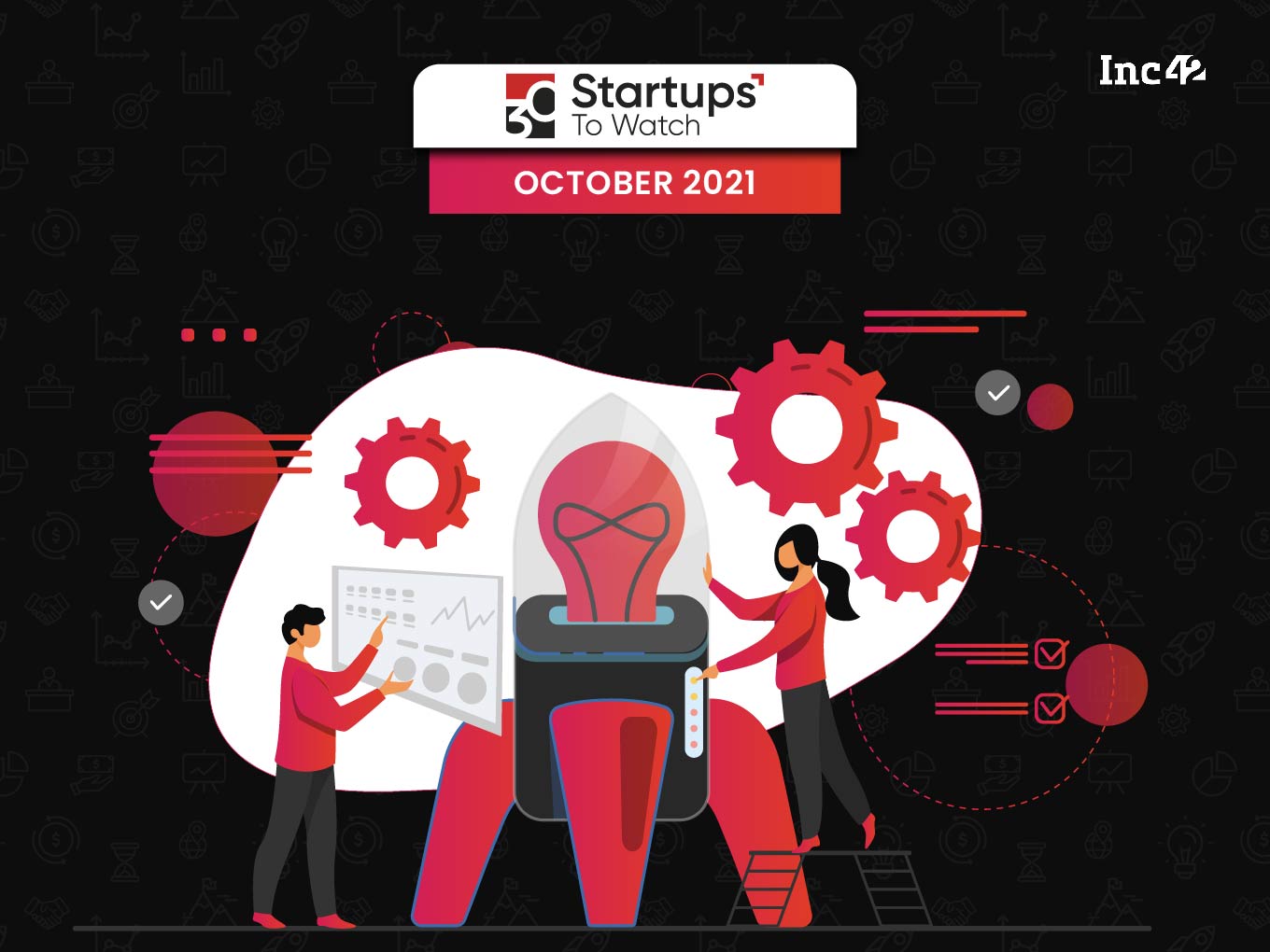
The world has taken a quantum leap towards digital. And digital has changed everything. From remote working and virtual networking to mobile gaming and OTT-first entertainment, from foodtech, edtech and telemedicine to fintech and digital asset classes, from a demure Web 2.0 to a blockchain-driven metaverse — the changes have been unprecedented, a morbid thanks to the Covid-19 pandemic.
And businesses have metamorphosed in tune with these transformational changes. As we sat down to shortlist the startups for October, we wanted to highlight the uncommon use cases of the internet and the rise of IR 4.0 (AI-ML, big data, SaaS, IoT, simulation, robotics and more) disrupting the most rudimentary aspects of human life.
30 Startups To Watch: October 2021
This month, we have focussed on still-to-be-launched startups entering uncharted territories and ushering in novel digital use cases. We have also taken a look at the early-stage startups whose solutions are meant to help businesses perform better and provide a zero-glitch online experience to end consumers from traditional segments. Their solutions are also enhancing the use and reach of new-age skills.
The October list consists of 15 B2B startups that are leveraging workflow management to overcome manual challenges. Five of these are SaaS (and a few other as-a-service) startups, operating in critical areas like networking and customer acquisition, communication firmware, creator economy, e-pharmacy ecosystem, predictive maintenance in manufacturing and blockchain tech.
Interestingly, all the startups listed here are less than three years old. In fact, three years ago, most of them would not have been so widely accepted as they are now. But due to hyper-digitalisation and a steady march towards future tech, they have either attracted an extensive clientele or come out with innovative solutions that can address common pain points.
Check out the 21st edition of Inc42 Plus’ 30 Startups To Watch list.
Editor’s Note: The list below is not meant to be a ranking of any kind. We have listed the startups in alphabetical order.
100ms
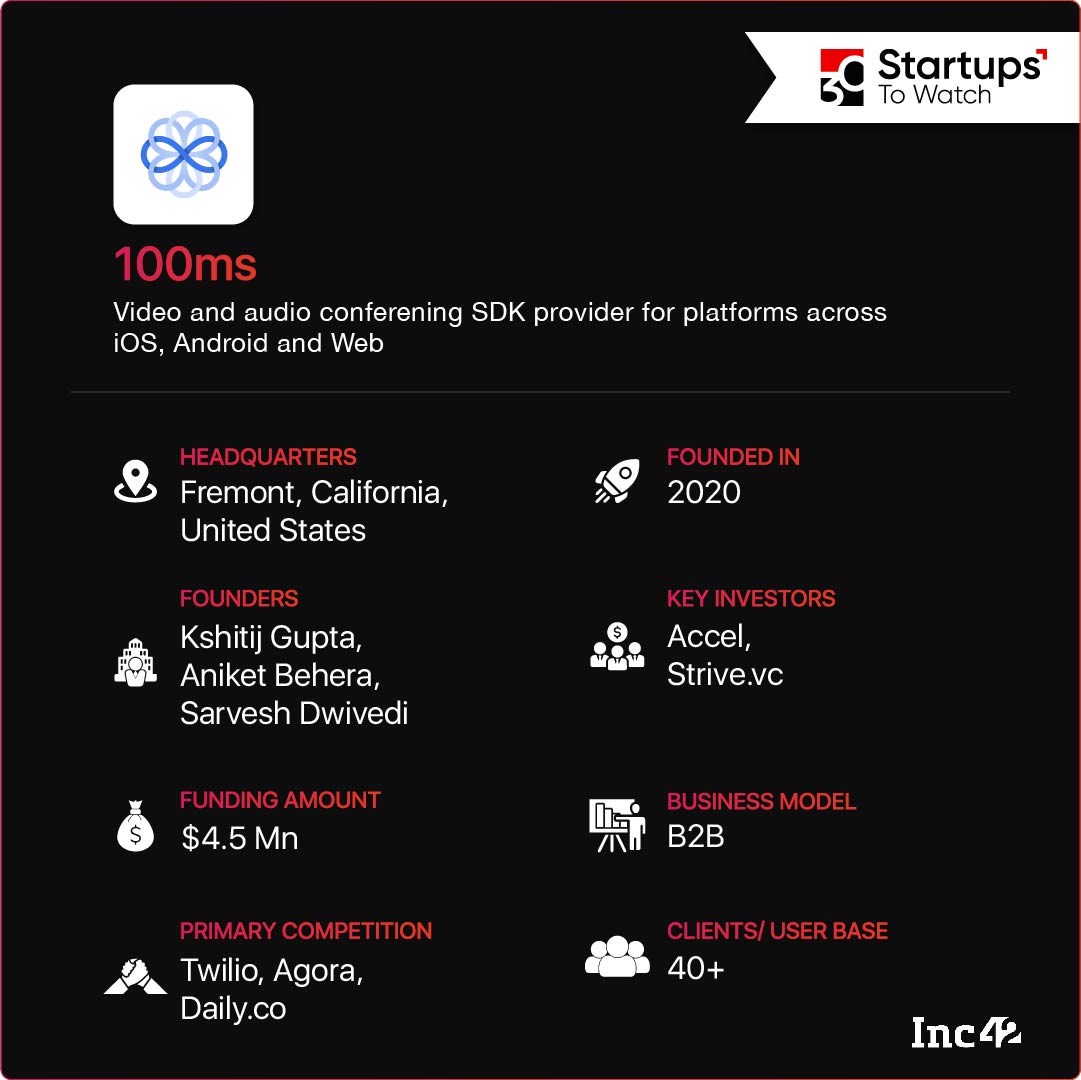
Why 100ms Made It To The List
Virtual connectivity, primarily through video conferencing, saw the biggest boom during the Covid-19 crisis as schools and workplaces, businesses and essential services, events and social activities moved online. To cope with the new normal and reduce juggling between apps, platforms started adding live video features to their offerings. But the transformation required a lot of effort and technical integration, resulting in initial hiccups.
Set up in 2020 by a team of former Disney+ Hotstar developers, 100ms provides Zoom- and Clubhouse-style audio and video solutions for apps and websites to optimise their recent change efforts and ensure a seamless communication experience. The startup’s software development kits (SDKs) help build conferencing, recording and real-time messaging protocols (RTMP) for live streaming on Facebook, Twitch and similar platforms.
But unlike other integrators, the PaaS company offers simple codes to make it easy to deal with disconnections and bandwidth issues across different use cases, including video conferencing, virtual classrooms, audio rooms and virtual events.
It currently caters to edtech, fitness and ecommerce firms, as well as live events, and some of its prominent clients include Paytm Insider, BookMyShow, Swiflearn, HomeLane, Circle, Kutumb and GetMega, among others. The company has a subscription model in place and plans to enter a few more areas like telehealth and gaming retail. It is also developing templates to enable a low-latency and device-agnostic plug-and-play format.
Anar
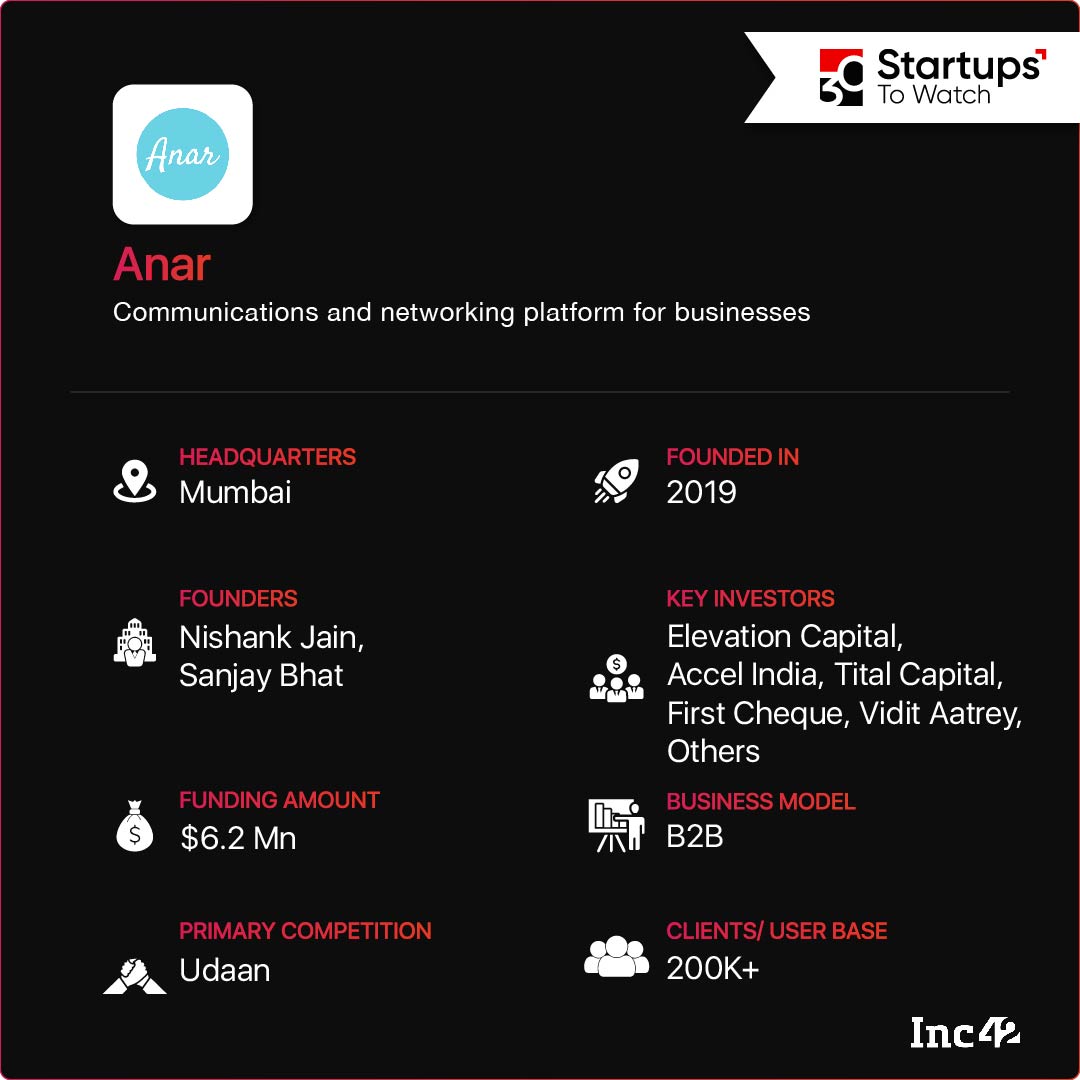
Why Anar Made It To The List
Small and medium businesses without too many contacts need to network constantly to find new suppliers, vendors and clients for the best possible deals. However, more than 85% are not part of gainful business networks that will spearhead growth. To provide SMBs with breakthrough business opportunities through effective networking, Mumbai-based Anar has developed a B2B networking platform that connects all stakeholders across the value chain, including manufacturers, wholesalers, retailers and resellers.
The startup onboards businesses from multiple segments, especially from jewellery, apparel, footwear, leather goods, groceries and other consumer goods verticals. Companies can create their profiles on the Anar app, upload product/service catalogues, connect, post requirements and create feeds/posts. As of now, there is no charge to register and network on the platform.
Currently, Anar hosts 2 Lakh+ business owners, providing them access to new products and markets. Going forward, it aims to be the go-to networking platform for Indian SMBs and connect 7 Cr+ businesses to a vast network, create their digital identities and help them stay updated with industry trends.
Aquatein
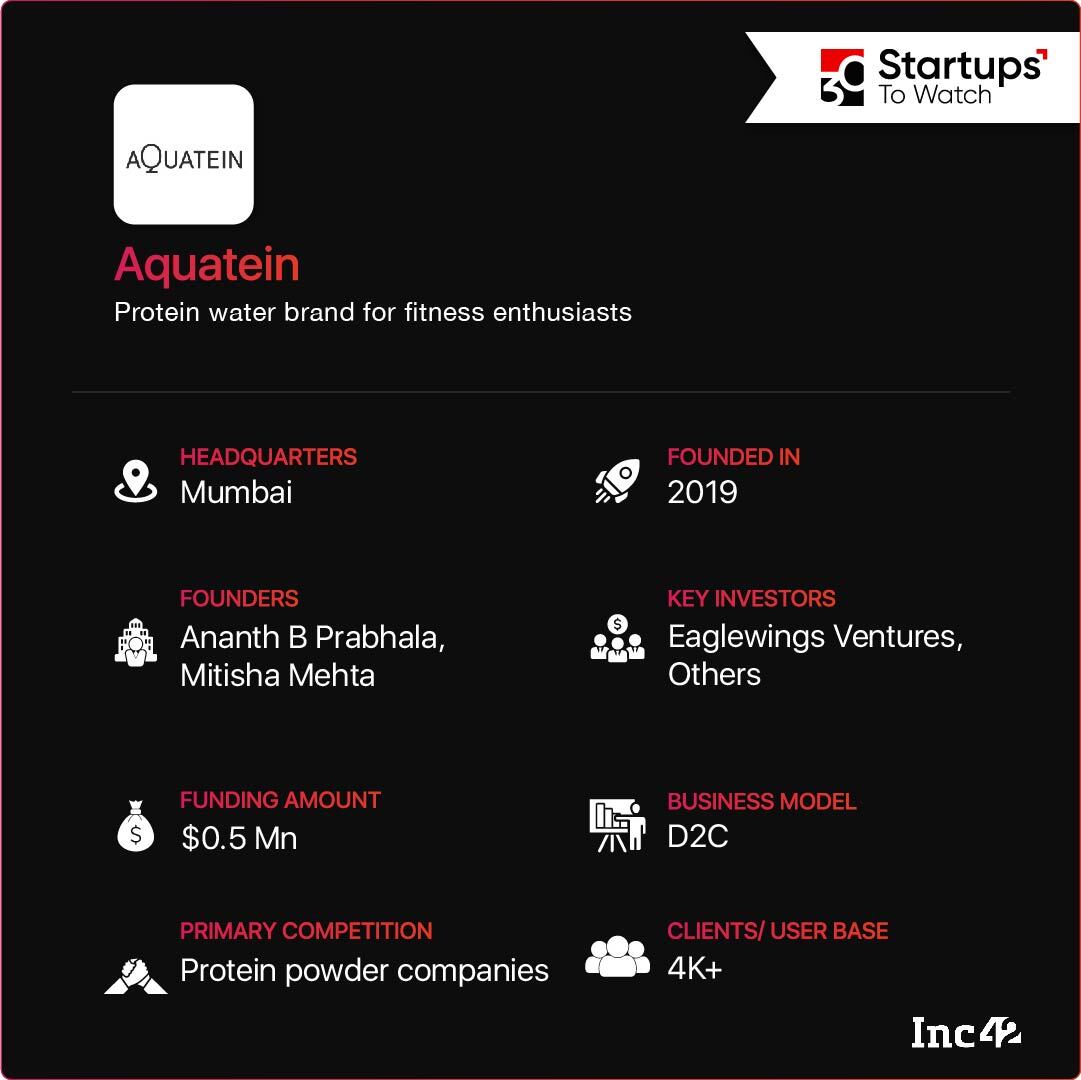
Why Aquatein Made It To The List
Most people do not consume as much protein as they need, the average requirement being 0.8g for each kg they weigh. Moreover, some people like sportspersons or the elderly or those undergoing treatment for critical medical conditions like cancer must have higher protein intakes for muscle mass and body repair.
Taking note of the country’s fast-growing protein requirements, Mumbai-based Aquatein has made protein intake as simple and refreshing as drinking water. Instead of the traditional protein bars, powders and drinks, the startup produce powder-less and low-calorie protein substitutes in the form of packaged water, satiating thirst and protein deficit while aiding muscle building and weight loss. Besides the health-conscious, patients recovering from chronic or critical diseases are also among its takers.
Its products are available in two variants (21g and 10g protein) and four flavours — strawberry, orange, green apple and mixed berry. It retails protein water via its website and Amazon and also plans to tie up with brick-and-mortar pharmacies, nutrition stores, fitness centres and more. However, the whole business or bulk selling is only done offline.
The company claims to have sold more than 1 Lakh bottles of protein water since its inception and aims to roll out its products across major metropolitan cities by FY22. It is also focussing on sustainability and recycling PET bottles into activewear in partnership with Ecohike.
The nutraceutical startup recently raised $0.5 Mn from Eaglewings Ventures to acquire more customers, expand its retail channels and introduce new products.
Arcana Network
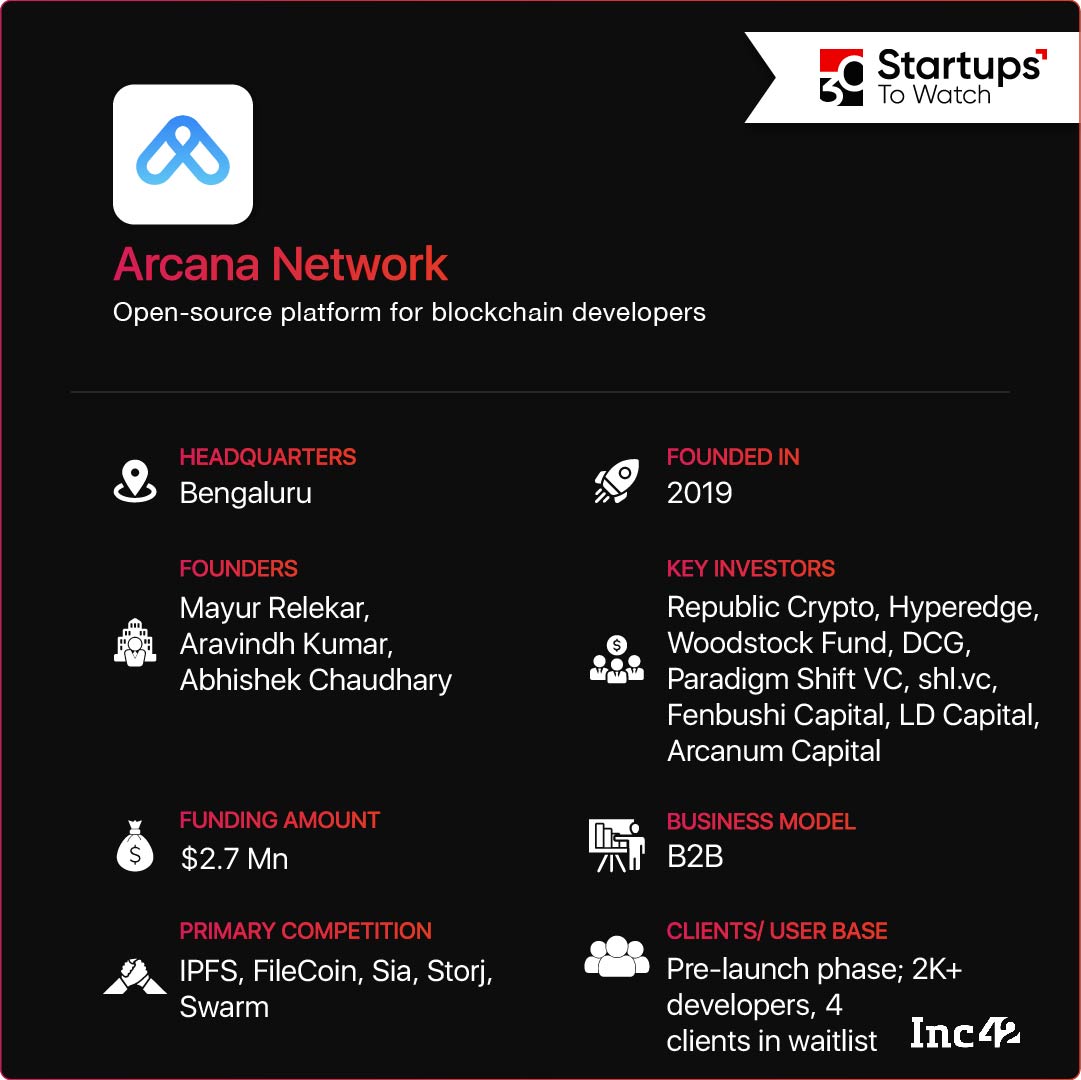
Why Arcana Network Made It To The List
Data is the new oil in a digital-first global ecosystem, and secure data storage has become the top priority of both enterprises and individuals. This is where the likes of Arcana Network hold an edge.
Cofounders of the Bengaluru-based blockchain startup believe that the future is decentralised, and every Web 2.0 company will be rebuilt for Web 3.0. That is a massive growth opportunity for the developer community seeking to build easy-to-use but more secure apps that are decentralised and transparent. As Arcana offers a privacy-first decentralised storage option for dApp developers working on Ethereum and EVM-compatible chains, its SDK has seen significant traction among the community.
The startup says it has a waitlist of 300 developers who want to leverage the ecosystem, but it plans to limit the number to 500. Its target market is the 3,500 blockchain apps (built over Ethereum) in India, the US and Southeast Asia. The go-as-you pay platform will also introduce fiat currency payment and wallet authentication for the apps under development.
As the company plans its test net launch for developers to try use cases, it will also announce a bug bounty campaign with $25K in prizes. Along with the main net launch, it will also inaugurate its public token sale, followed by a listing.
Binks
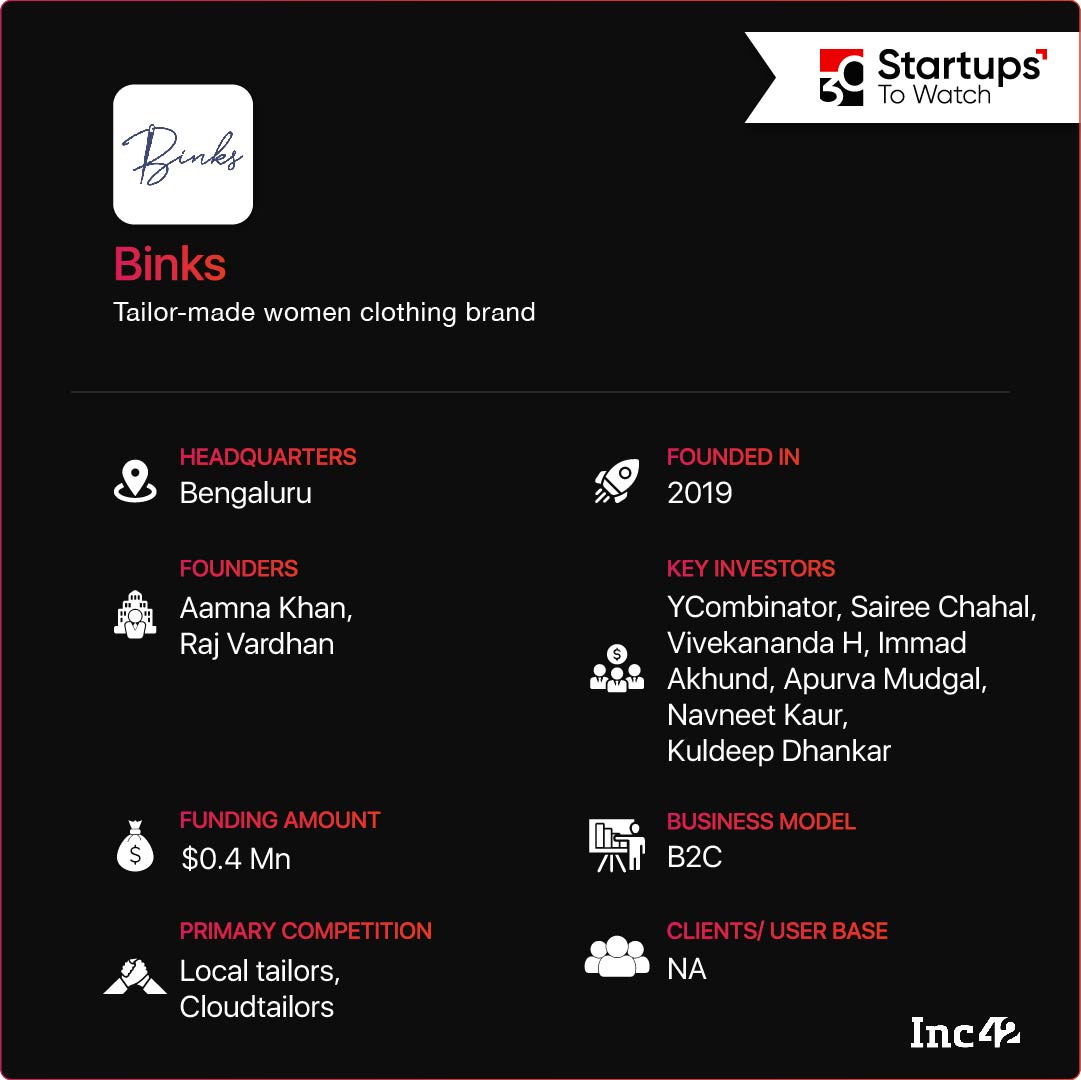
Why Binks Made It To The List
Although ecommerce has made it easy for people to buy clothes online, fashionistas still prefer tailor-made outfits to stand out from the crowd. Overall, the tailoring community thrives as most people visit local tailors for stitching garments or clothing alterations. However, finding a good tailor specialising in women’s wear is quite tricky.
Even as tailoring services across the country are ready for a much-needed upgrade, Bengaluru-based Binks provides custom-stitched outfits without physical visits to any outlet. This is how it is done. A customer has to share a picture of her preferred design, following which a female consultant calls her to discuss customisation options. Measurements can be provided through a DIY kit or at the time when the consultant picks the fabric. Next, the customer gets on a video call with a designer, and a design board is shared for approval before the material goes for stitching.
Binks is currently operating only in Bengaluru but plans to launch in five major cities and set up two more production centres by FY22. Its product line features more than 21 categories, from jackets to ready-to-wear sarees, priced between INR 1,000 and INR 3,000.
Codedamn
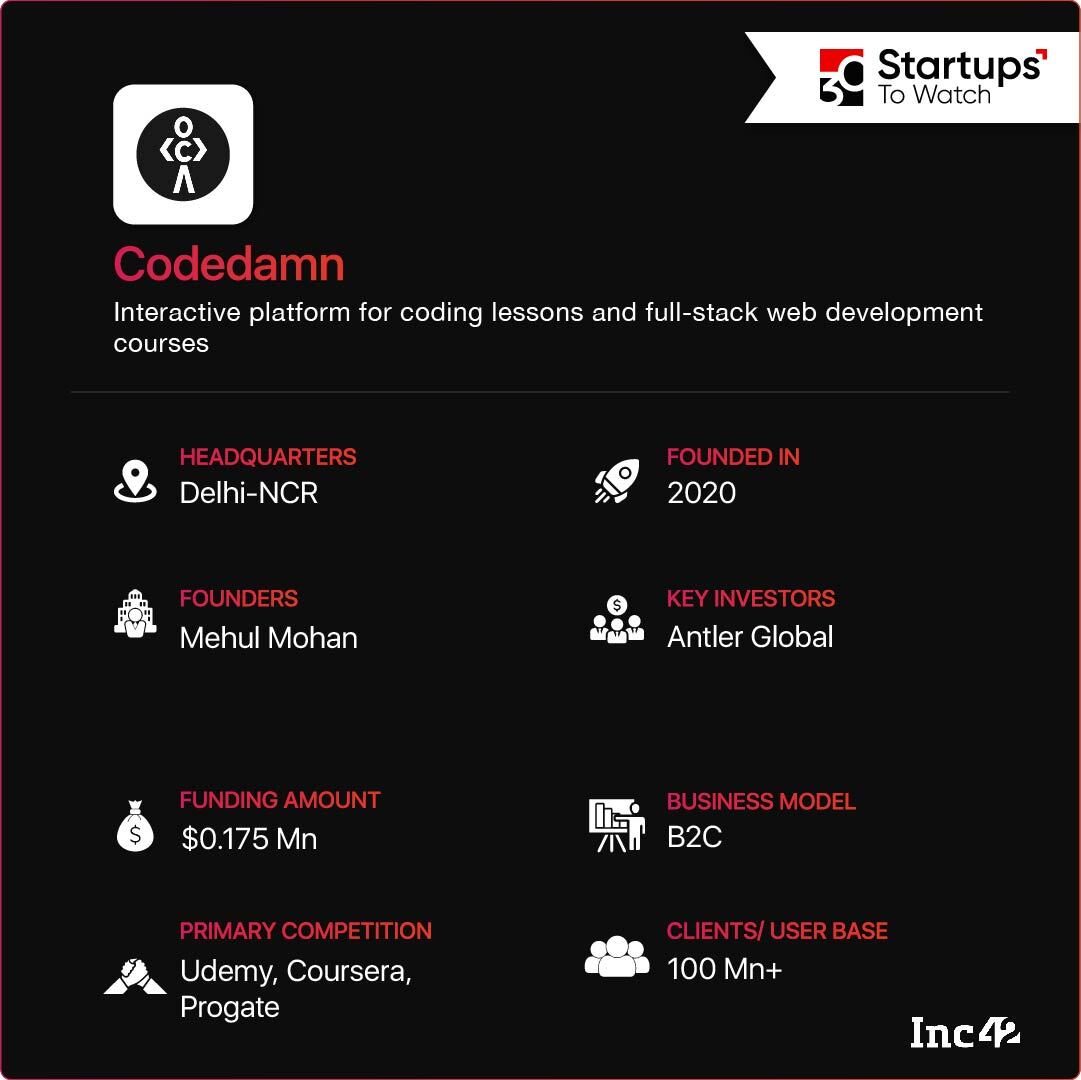
Why Codedamn Made It To The List
Thanks to new-age job profiles like specialist engineers, AI/ML programmers and full-stack developers, India’s demand for tech talent has exploded. To meet the shortage of job-ready candidates, edtech startups regularly organise coding boot camps, but they come with a price that few could afford. On the other hand, free online courses often lack clarity, quality and hands-on practice sessions.
Mehul Mohan, a self-taught person who learnt to code at the age of 12, was aware of this widening gap (too many companies chasing too few professionals) and set up a YouTube channel called Codedamn to provide easy access to affordable coding. The traction was phenomenal. Before its website was launched in 2020, Codedamn’s YouTube channel had more than 100K subscribers.
The Kochi-based startup has now developed an interactive coding platform for first-time coders and another programme for experienced developers to learn, practise, build projects and get instant feedback from the community. Even beginners learn full-stack web development, and they can create product portfolios to showcase their work to recruiters.
It currently offers 28 full-stack web development courses across HTML, CSS, JavaScript, Cypress and React, among others. While most of these courses are taught by Mohan, other trainers include Ania Kubow, Laurence Skevis, Pedro Machado and Basarat Ali Syed.
Still in beta, Codedamn operates a freemium model and claims to have a 1 Mn+ user base in India and abroad, most of whom are paid users.
Easocare
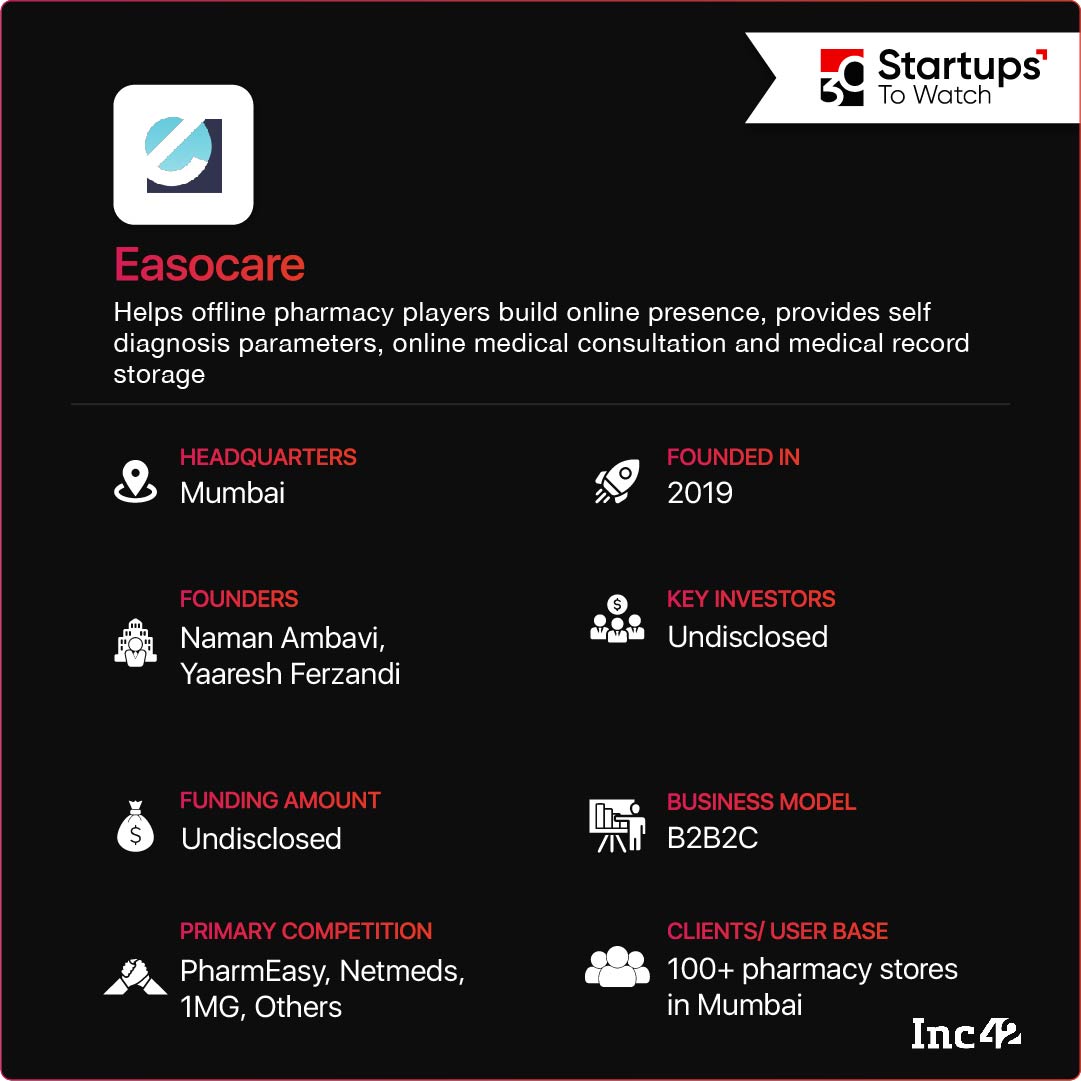
Why Easocare Made It To The List
The healthtech segment has been booming since the Covid-19 pandemic. But not all retail medical stores could commence their online business to leverage never-before growth opportunities as part of a hyperlocal ecosystem. In fact, small pharmacies and unorganised players found it difficult to take the digital leap due to high capital costs and technical difficulties.
To help boost digital adaptation, Mumbai-based Easocare launched a flagship platform in June this year that enables brick-and-mortar pharmacies to set up digital storefronts.
Easocare for Pharmacy is a subscription-based SaaS platform that provides a bunch of WhatsApp-based solutions to offline chemists/pharmacists to expand their businesses online. These include the integration of WhatsApp Business API, online payment acceptance, invoice management, in-built customisable banners, business cards and inventory management software for preloaded online stores.
Although the company started its pharmacy project in mid-2021, it has been operating since 2019 and offers online medical consultation and lab testing services through its partnership with another healthtech firm Swasth. Other healthtech services include AI-based report reading and medical document storage for consumers, a Covid-19 live tracker and an API for self-checking symptoms.
Its B2C healthtech app has been downloaded 7K times, with more than 15K lab tests done for 4.5K+ users. As for the pharmacy project, Easocare has onboarded 100 medical stores across Mumbai and aims to service 500 medical stores by FY22. Eventually, it aims to become an end-to-end digital solution provider for pharmacies, with additional services like supply chain management, billing and setting up PoS for retailers.
Eloelo
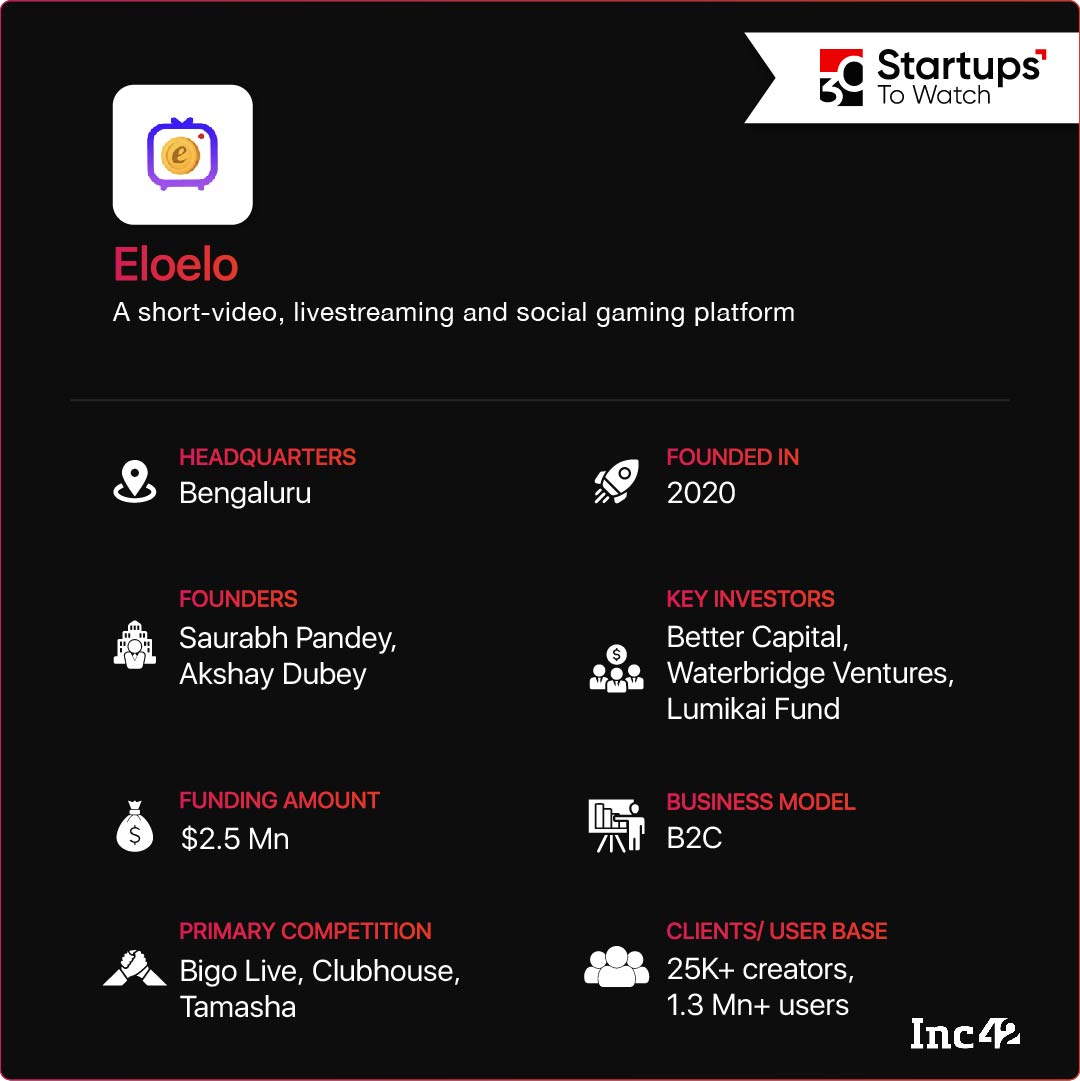
https://ift.tt/3w7sMDt
Why Eloelo Made It To The List
The Covid times saw a boom in the creator economy as people stayed at home during the lockdowns and spent their time perusing online content. With more than 450 Mn gamers around, online/mobile gaming flourished most in India, and so did creator-led social gaming that revived a host of cultural traditions and events.
Bengaluru-based Eloelo, a platform that live streams indigenous social games, was set up in 2020 to make the most of this newfound socio-cultural ambience and help creators host games and connect with their fan base through live social gaming.
The concept stemmed from television game shows, and the startup currently focusses on antakshari, tambola, quiz contests and more. The games feature talented performers and are live-streamed on the Eloelo app.
The short but interactive format and the appeal of casual social gaming in a safe environment have also seen significant traction. Eloelo claims it has hosted 100 Mn live gaming sessions and has a user base of more than 1 Mn. It also boasts an audience size of 10 Mn+, 50+ live games and entertainment categories and 1,000+ daily live streams. What’s more, 70% of its users are from non-metro locations and spend more than 60 minutes a day on the app.
The content is free for users, but content creators can earn money by selling merchandise via Eloelo’s in-app purchase mechanism. The company is also working on a non-ad-based revenue model based on the commissions earned through in-app purchases.
The startup will launch an interactive TV-style digital stage, where guests can join live events or game shows. This feature will help create KBC-like shows while players and users can participate virtually.
Evenflow
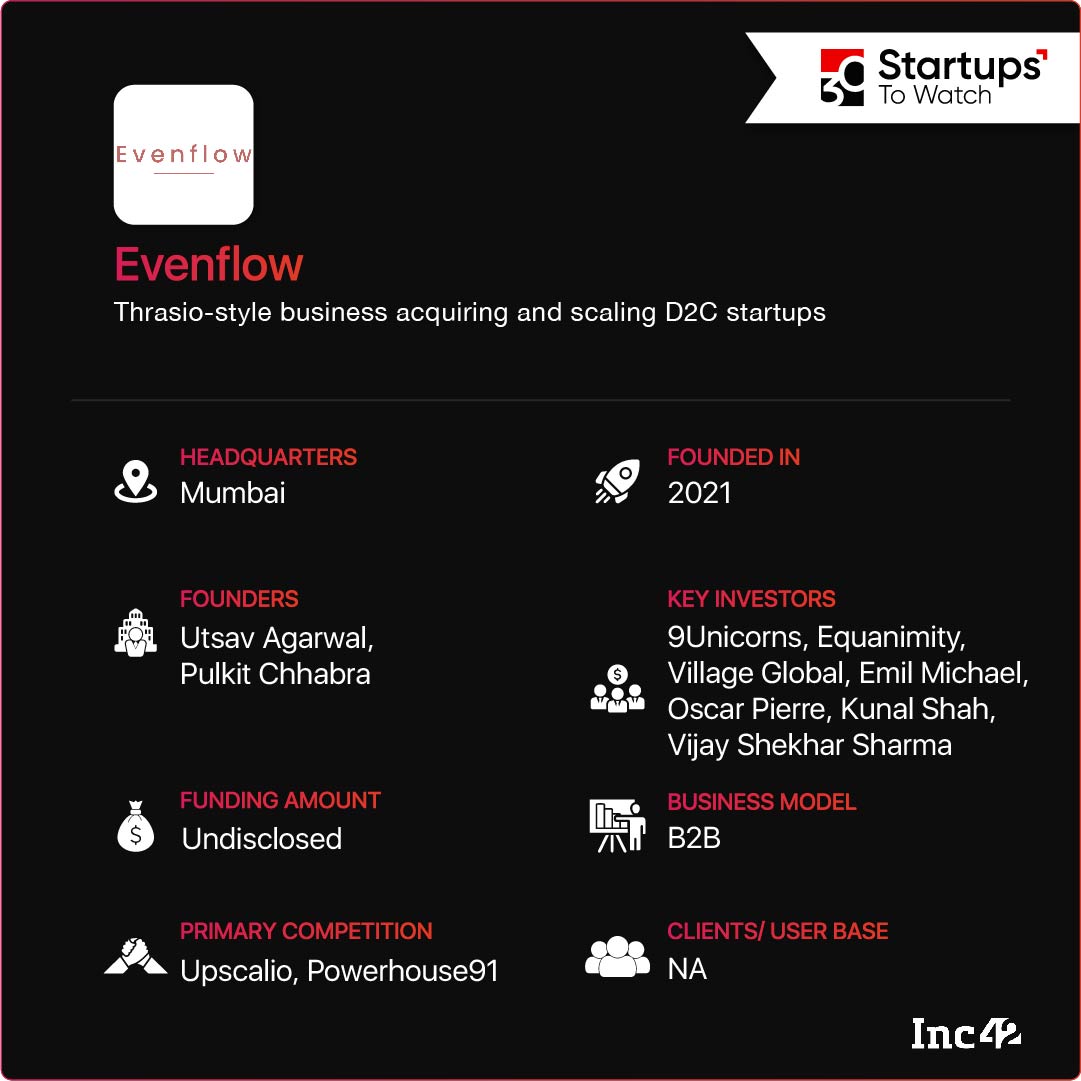
Why Evenflow Made It To The List
India is home to 800+ D2C startups, and the number is likely to grow as D2C companies have raised $783 Mn in the first seven months of 2021, a 251% rise than the entire CY2020. This unprecedented growth has also ushered in disruptive business models such as the enabler ecosystem and ecommerce rollups/Thrasio model. The latter is all about acquiring and funding selective online brands en masse to ensure hypergrowth in specific segments.
Mumbai-based Evenflow is one such company, setting its eyes on brands that generate 80% or more revenues from ecommerce marketplaces like Amazon or Flipkart. But unlike other Thrasio-style firms where acquisition depends on revenue multiples, Evenflow targets startups based on EBITDA multiples. It provides an immediate exit to founders by making an upfront payment and continues to pay a percentage of the revenue for two more years.
However, acquiring companies is only one part of Evenflow’s business. Its real target is to scale and turn around sellers in record time by optimising critical processes, including operations, supply chain, brand and performance marketing and more. It claims to have scaled BabyPro (one of its two acquisitions) by 400% in 90 days after buying the startup in June 2021.
Mumbai-based BabyPro makes homes safe for young children by securing living spaces to prevent accidents and injuries. The other acquisition was Rusabl, an eco-friendly daily utility brand. Evenflow has an aggressive acquisition plan and aims to purchase and scale 80-100 startups in the next three years.
Exly
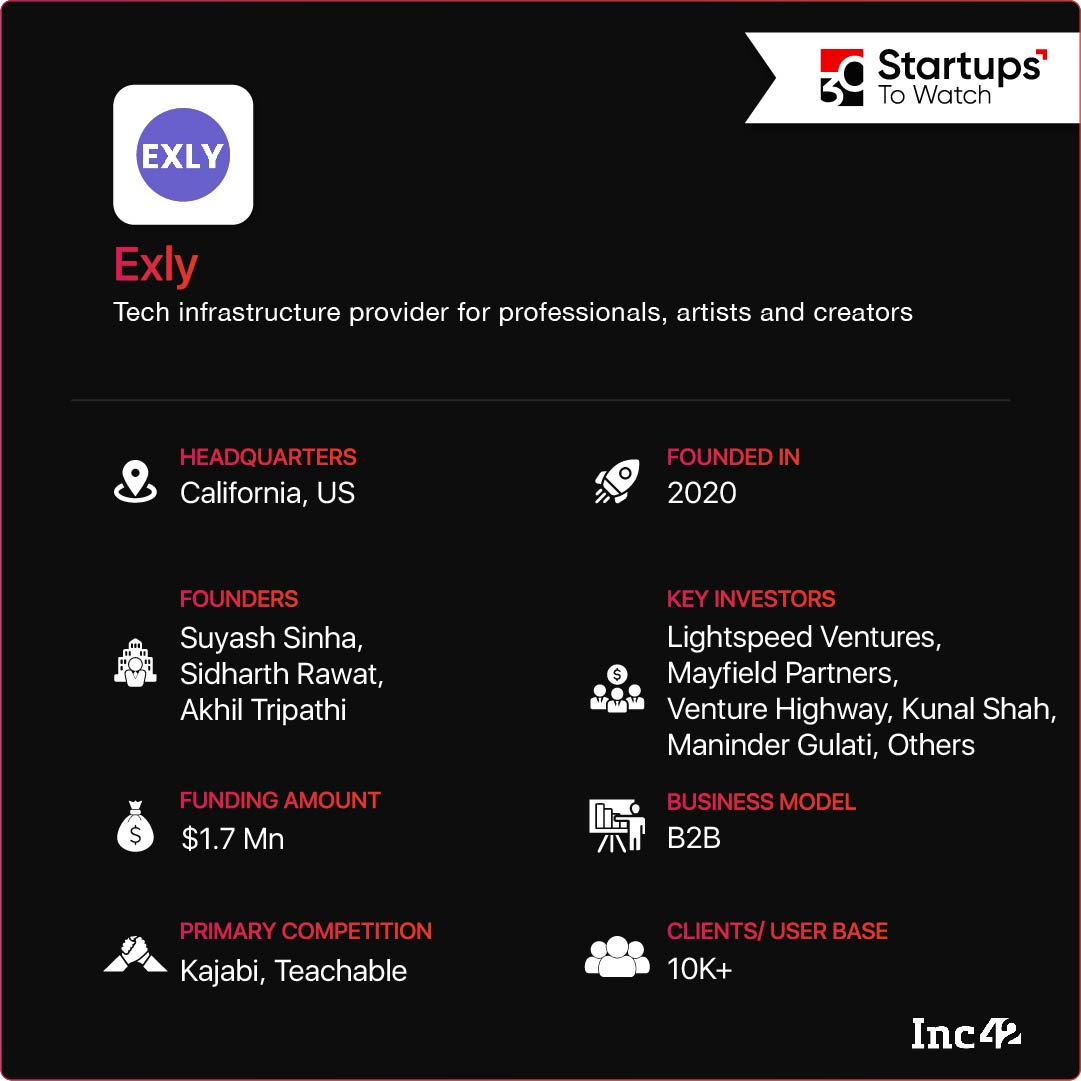
Why Exly Made It To The List
Life coaching and skill training are all the rage nowadays as experts in various fields can help people with self-improvement and talent development. These solopreneurs come from diverse backgrounds, though. They could be fitness instructors, wellness specialists, fashion gurus, financial advisors, career counsellors, mentors and more, looking to earn a decent amount outside their regular jobs. Then there are full-time or part-time life coaches who are part of the white-collar gig economy.
To support the shift of the employable population from traditional 9-to-5 jobs, YCombinator-backed Exly (previously Myscoot) has developed a ‘business builder’ platform so that professionals can launch, manage and grow their businesses online. The startup calls them exlypreneurs and helps them build websites and set up social media channels to grow organically.
Exly’s offerings come in three parts. There is a scheduling and packaging software programme for end-to-end digital business solutions. This covers creating an online presence and managing supply chain and payments besides recording courses (for educators), setting up workshops and consultation facilities.
Its marketing suite helps users run automated email campaigns, design early-bird offers, develop discount codes and more. Finally, a CRM suite helps with the automation of to-do tasks and analytics, providing complete visibility and control over the business.
Another interesting aspect of the startup is that creators on this platform can collaborate with partner brands and earn via sponsorships, commissions and advertisements. Exly charges a fixed fee or commissions (sometimes, a mix of both), based on requirements and the platform usage. It is currently catering to more than 10K creators and plans to onboard 1 Mn+ by 2025.
Flippy
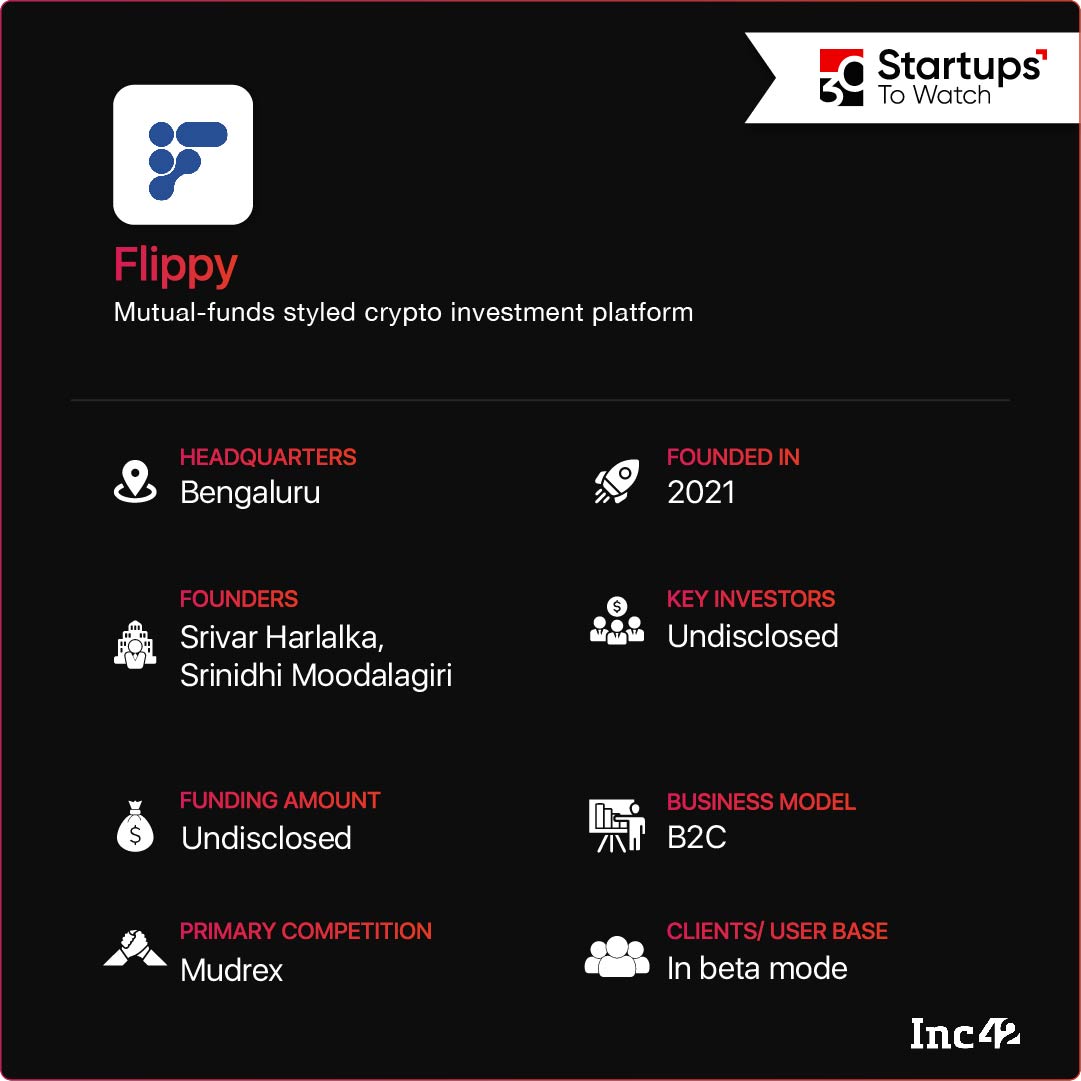
Why Flippy Made It To The List
In the past year, investments in cryptocurrencies have seen a breakthrough rise in India despite regulatory uncertainties and the volatile nature of this new asset class. But nescient traders/investors find it difficult to navigate through the crypto maze or put their money into pooled investment funds to leverage various assets like crypto, NFT, DeFi and more.
So, Bengaluru-based Flippy has developed a fintech platform, simplifying crypto investments through mutual funds-like baskets and providing investment intelligence from crypto-influencers. The idea is to help retail investors, especially Gen Z, make better investment decisions and ensure that the shift to digital assets will be smooth and seamless.
The platform is still in beta but currently has six baskets open for existing users who joined by invite. These ‘baskets’ will help people build diversified portfolios just like it is done in traditional assets. Flippy has already tied up with crypto exchange Bitbns and claims to have partners among some of the biggest exchanges in the country. It is also working with prominent crypto influencers and pro traders to boost the advisory part of the business.
The company is still working on its revenue model and planning a soft launch by the end of 2021.
Flow Club
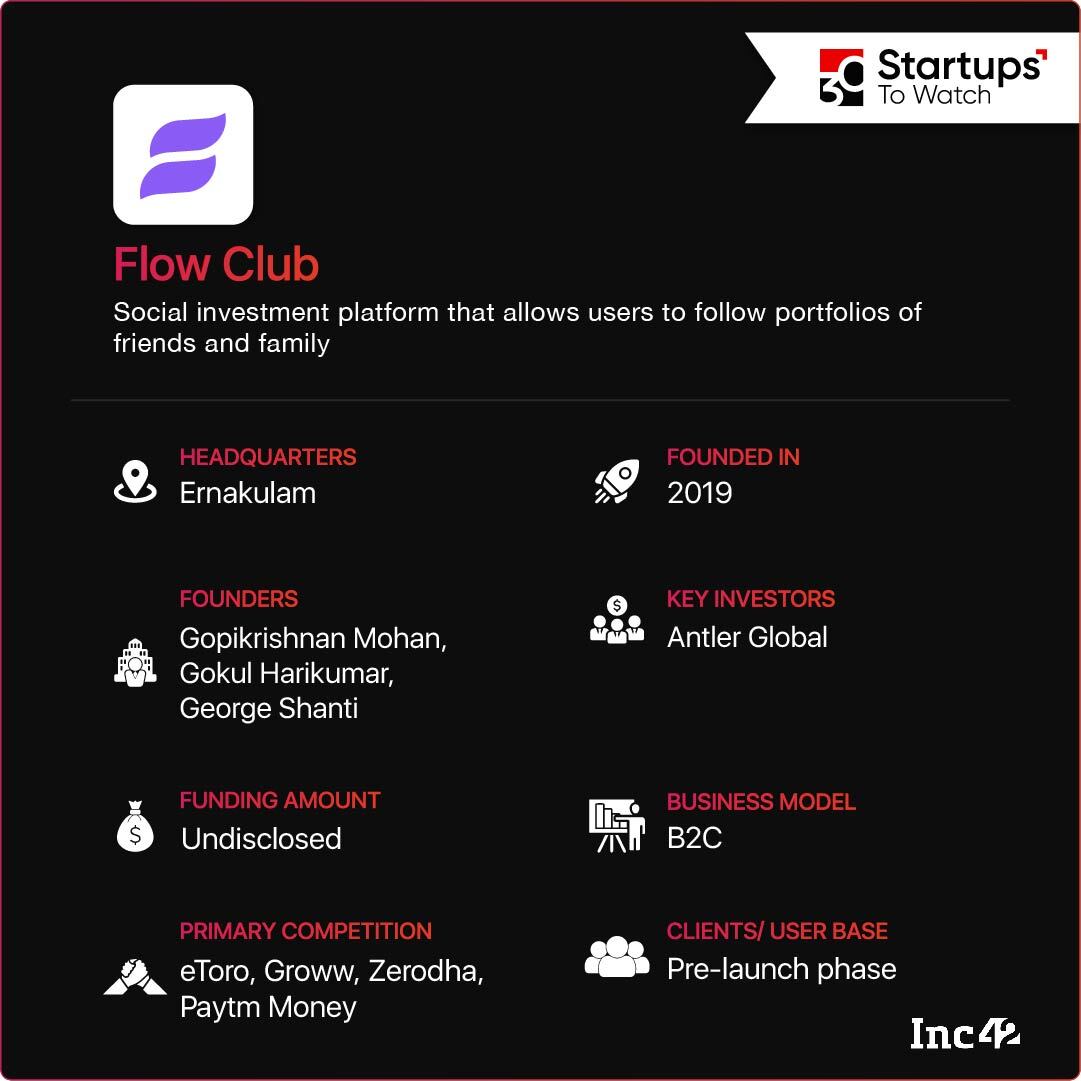
Why Flow Club Made It To The List
Until recently, making an investment (stocks, mutual funds, gold or even a fixed deposit with a bank) required at least three extensive sessions. To begin with, one had to find an explainer platform to understand the concept, followed by a performance tracker/research platform and, finally, a transaction platform. In-between, one has to decode industry jargon, complex graphs and confusing processes.
In brief, DIY wealth management was never easy, and small/retail investors essentially relied on neighbourhood agents to make investment decisions. But Ernakulam-based Flow Club, a community-driven investment platform and an AMFI-registered mutual fund distributor, is making it a ‘social-first’ experience.
The Antler-backed startup believes investment platforms have a long way to go before all and sundry can use these. As social investment is required to grow financial awareness, the company is building a pilot programme to change the way people discover investment ideas, meet their investment goals and create wealth, with a reliable community to back them up.
It has the usual investment stack, helping people build portfolios and providing expert advice. But the USP here is that new investors can align their investment goals by taking the cue from verified portfolios. The startup has tied up with Kuvera, Groww, CAMS, Zerodha and Paytm Money so that investors can easily import their portfolios and share the same with the community to build confidence among members.
Flow Club also allows registered users to create groups called Clubs to interact with like-minded people and read in-depth investment analyses written by them. The company is still in beta but plans to launch in early November and is only open to early access.
GODI Energy
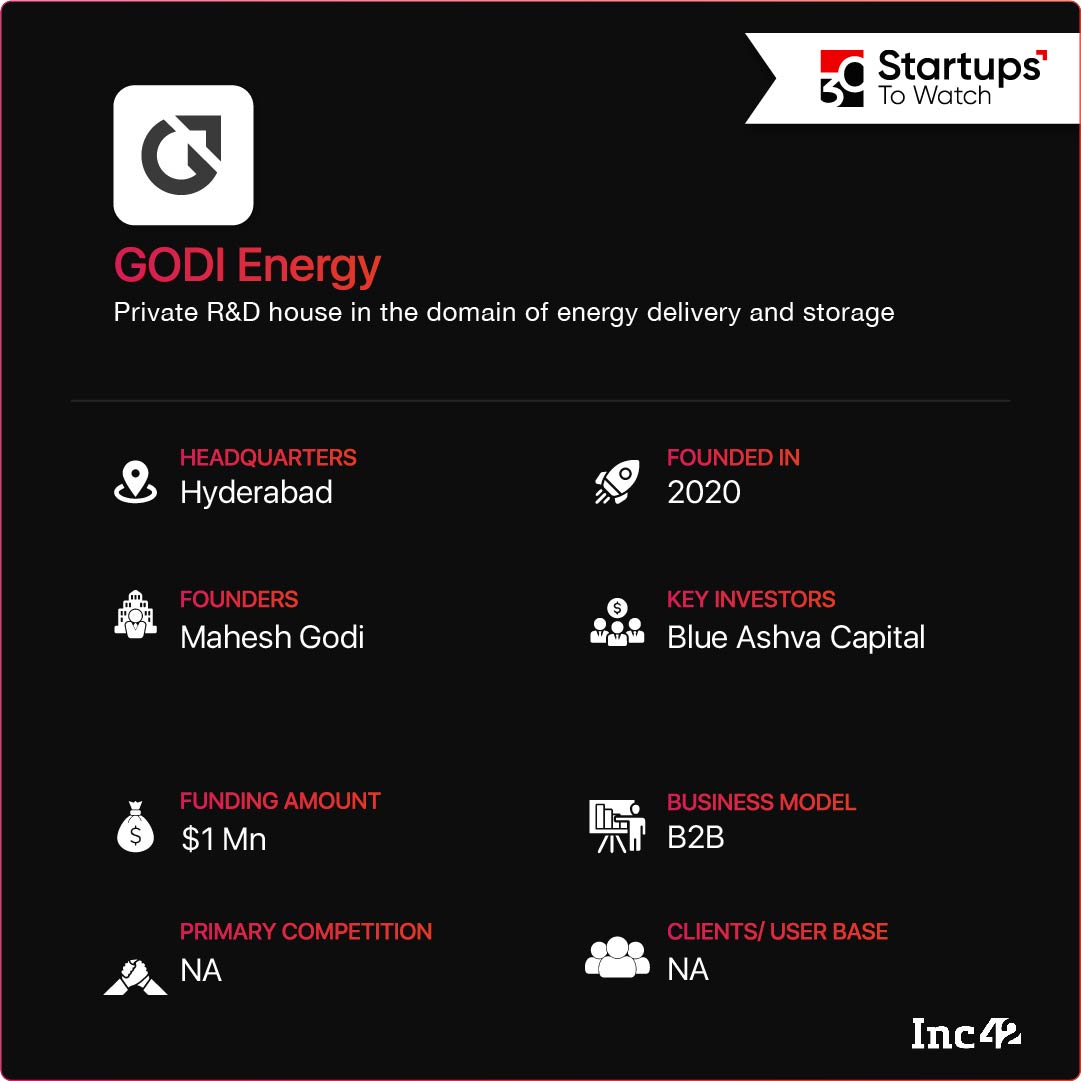
Why GODI Energy Made It To The List
As India moves towards carbon neutrality and mass adoption of EV and ESS (energy storage systems), manufacturers have to import battery packs and EV parts from OEMs. However, Indian companies need to explore homegrown energy storage solutions to bridge this demand-supply gap and ensure overall self-sufficiency.
Mahesh Godi, a veteran Silicon Valley professional, had a solution in mind, though. He returned to India with a plan to start the first-ever indigenous Lithium-ion (Li-ion) battery factory and set up GODI Energy in Hyderabad for this purpose. Currently, the startup is in the R&D phase. But it has already built a team of scientists, engineers and industry veterans from around the world with expertise in electrochemistry, material science, thermal engineering and advanced manufacturing.
The company intends to manufacture advanced Li-ion cells and hybrid supercapacitors as its flagship products. The latter enables high voltage at the cell level for regenerative braking, short-term storage and burst-power delivery.
It will also develop a wide range of rechargeable cells, including Li-ion, Na-ion (sodium) and all-solid-state batteries, as these products have a variety of applications across automobiles, consumer electronics and renewable energy storage.
Habbit
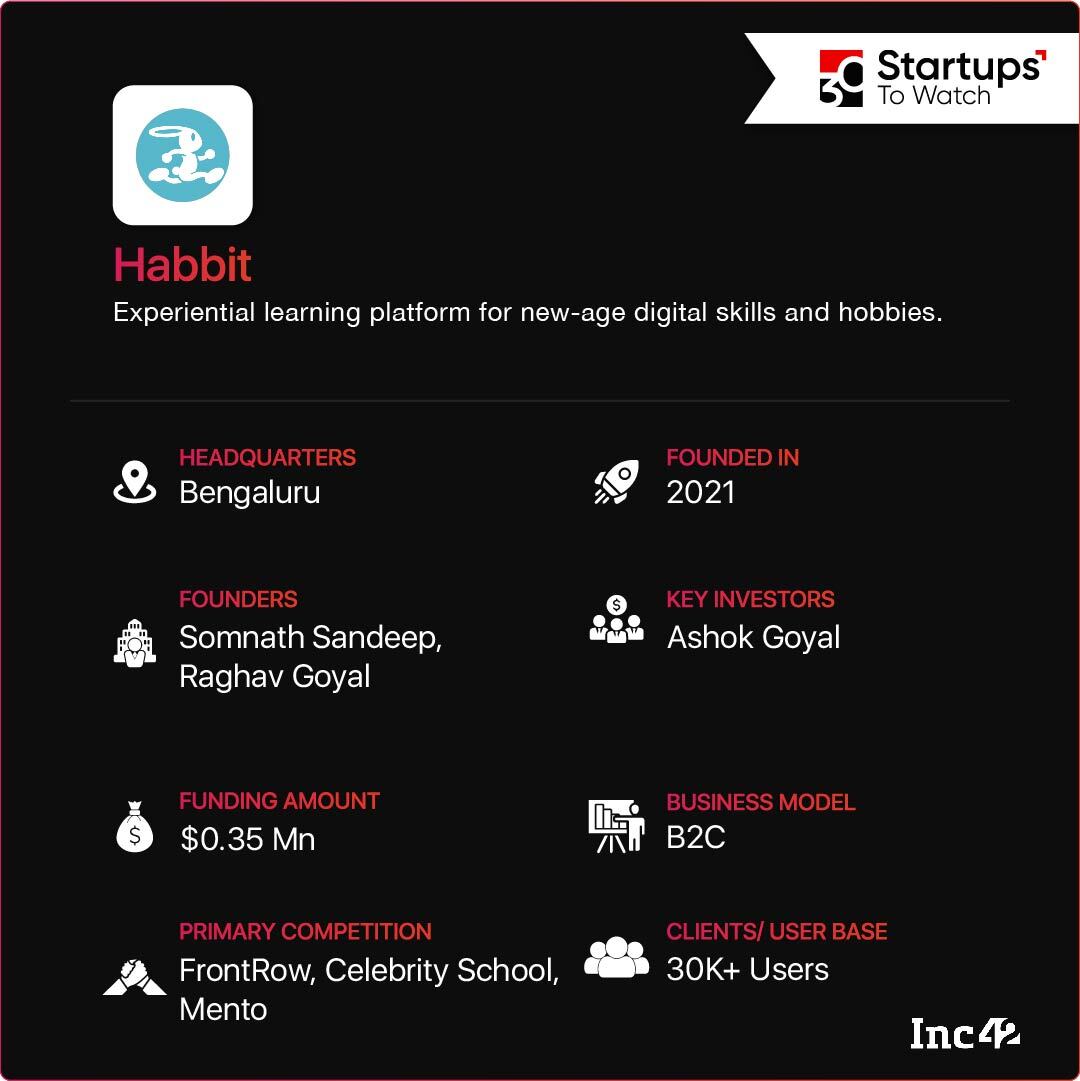
Why Habbit Made It To The List
Gone are the days when career choices were limited to top professional courses (India’s obsession with engineering is still phenomenal). With the rise of tele-education and the emergence of various courses, almost anyone can learn a unique skill online and make a successful career out of it. But here is the catch. Most of these specialisations have sprouted in the past few years, and many are yet to be recognised at the institutional level.
This is where community-driven learning platforms like Habbit come into play. The Bengaluru firm helps learners upskill through live classes held by experts/creators who excel in new-age creative and digital skills such as art and craft, dancing, cooking, digital marketing, literature courses, yoga, astrology and more.
Habbit helps learners collaborate with other peers, creators and organisations and assigns projects so that they can build professional portfolios. It also allows creators to monetise their skills and become micro-entrepreneurs through a revenue-sharing model.
The startup claims it has more than 25K registered users and single-digit customer acquisition cost. With 20K+ community interactions through its android app and website, 15K+ interactions on user-generated content and 500+ projects in its kitty, Habbit says its content is a crucial trigger for driving traffic.
The market for extracurricular activities is estimated to be $10 Bn in India and around $200 Bn globally. In the ever-growing creator economy, Habbit is targeting budding creators through an experiential learning approach. It is also creating discoverability, better ownership and robust monetisation strategies through its services.
Hyperface
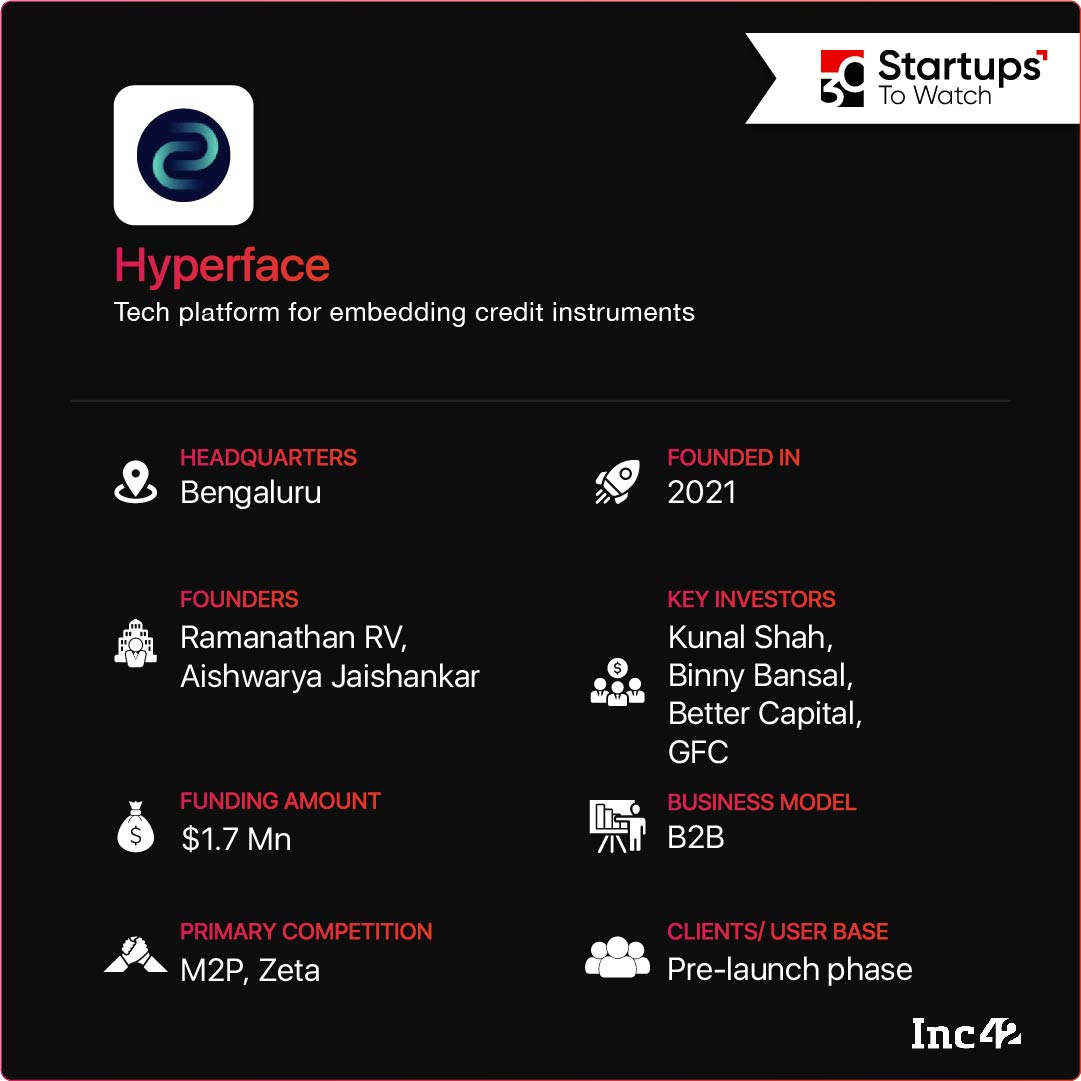
Why Hyperface Made It To The List
As digital payments continue to pick up the pace in India, the economy is witnessing a shift towards credit products. India had more than 62 Mn credit card users in FY21, up from 22 Mn in FY17. Even then, less than 4% of Indians have access to credit cards compared to 70% of the US population and 83% in Canada. So, fintech firms and ecommerce companies are keen to explore consumer credit products that can be tethered to essential or aspirational buying.
Finance professionals Aishwarya Jaishankar and R.V. Ramanathan had earlier advised several neobanks. So, they knew that it took most Indian companies close to two years to launch such products, unlike the US or the EU, where embedded finance has matured. To help the domestic market grow on a par with the global ones, they have developed Hyperface, a Credit Card-as-a-Service platform for businesses that want to integrate financial products into their mobile apps.
The Stripe-like platform enables a simplified but end-to-end payment system that ensures fast implementation and hassle-free operations. Besides, it offers a full-fledged BNPL (buy now, pay later) service and several add-on features such as consumer KYC services, rewards and loyalty programme management and payment reminders.
Bengaluru-based Hyperface is not operational yet, but it has signed up clients for a closed beta launch. It plans to go live by FY22 and aims to become an end-to-end SaaS provider for fintech/ecommerce companies looking to issue prepaid or credit cards.
InfyU Labs
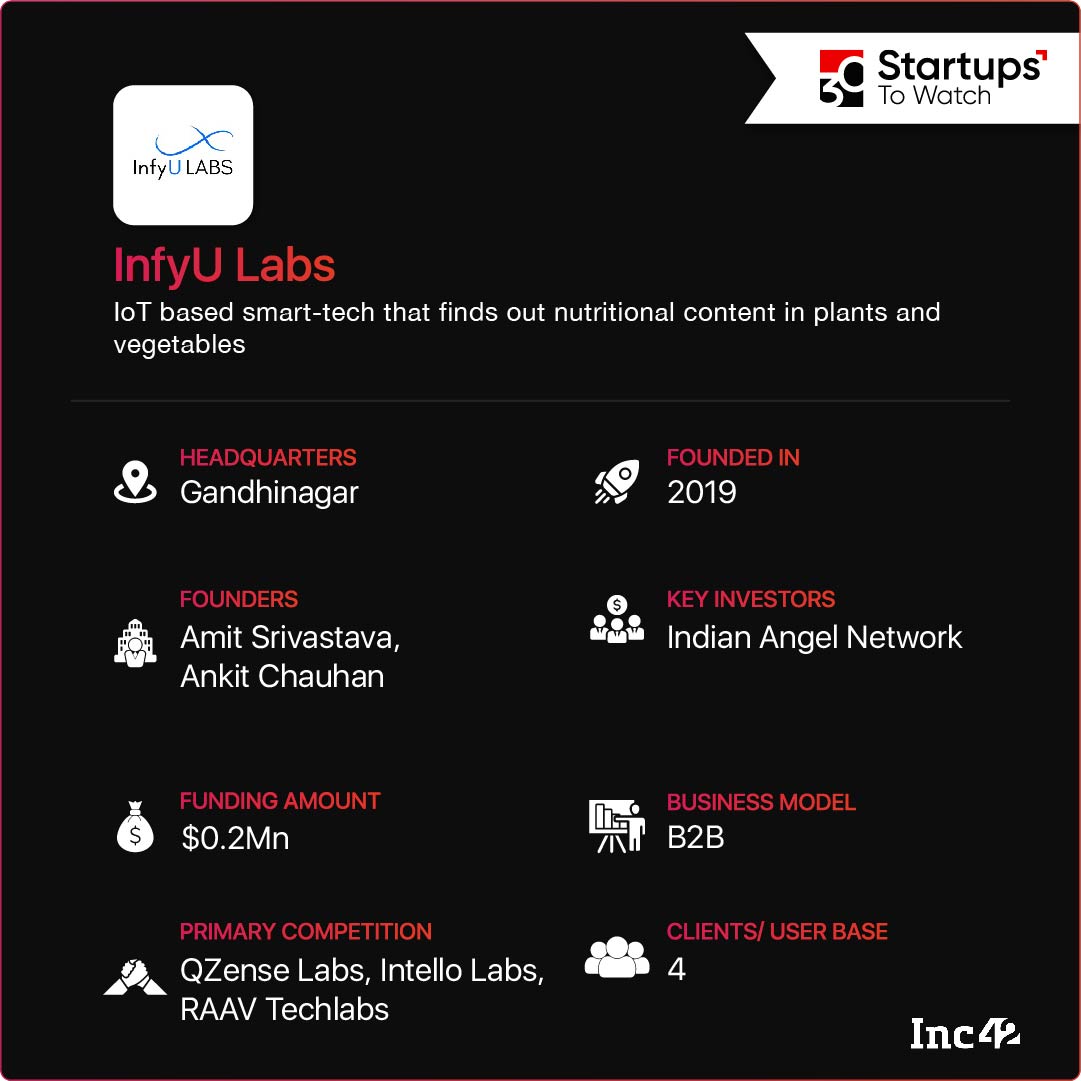
Why InfyU Labs Made It To The List
India witnesses wastage of farm produce to the tune of INR 244 Cr every day even as the country performs dismally on the Global Hunger Index. Monitoring the quality of perishable consignments (fruits and vegetables, for instance) before sending these to non-local markets is one way of reducing such waste. But there are still issues regarding the overall quality of agri produce and food safety.
To address these pain points, Gandhinagar-based InfyU Labs ensures that all stakeholders — farmers, food processors, wholesalers and retailers — can check the health of a consignment at any stage of the supply chain. Its flagship product is InfyZer, a handheld device that uses AI and spectroscopy to capture data regarding freshness, nutrients and harmful chemicals and grade fruits and vegetables in a non-invasive way.
The process is simple. All one has to do is point the hardware to the agri produce, and the Bluetooth inside the device will send product data to an app developed for this purpose. InfyZer carries out laboratory-grade tests and sends all relevant data to stakeholders, thus guaranteeing food quality and food safety.
The company has also developed InfyUV, a portable sanitisation device for disinfecting surfaces, and sells both products on its website.
The startup claims it is currently laying the groundwork for bolstering the supply chain. It plans to onboard more agritech clients from India, Canada, the US, and East Asia in the long term.
Karat Farms
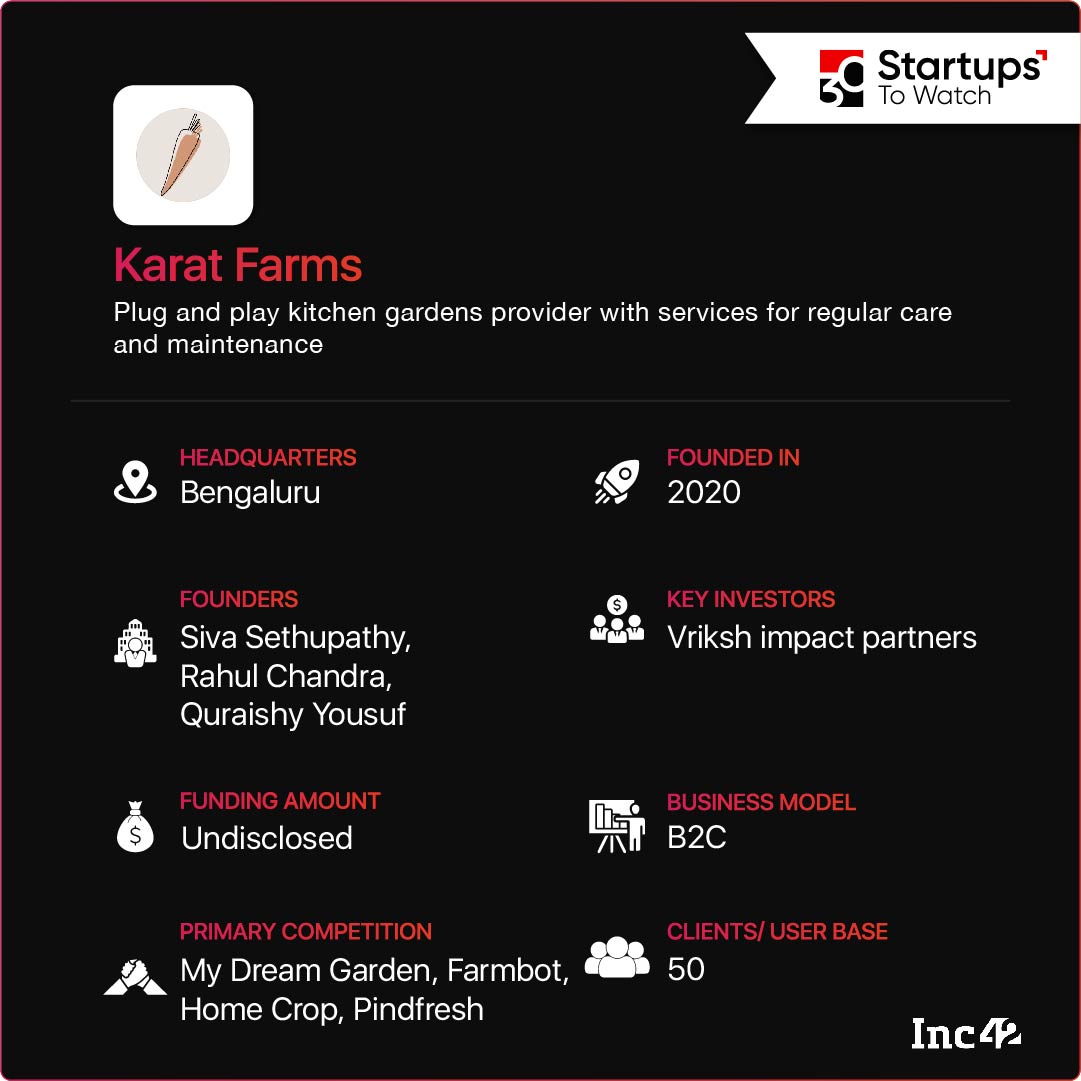
Why Karat Farms Made It To The List
Farm-fresh, chemical-free foods are becoming increasingly popular among city dwellers, giving rise to organic urban farming. In sync with this trend, a new breed of agritech startups helps people assess the agronomic conditions of the limited urban space (backyards, rooftop gardens, balconies and windows at home besides commercial complexes) and come up with unique ideas to optimise hyperlocal farming.
Incubated at the NSRCEL, the startup hub of IIM-Bangalore, Karat Farms decided to experiment with this concept and executed five rooftop projects in 2020. Buoyed up by the initial success, the company now develops kitchen gardens and provides essential support services, including supply of seeds and gardening equipment, installing automatic plant watering systems and setting up fertiliser reminders.
Interestingly, Karat Farm’s target audience is young kids as it believes that early-age farming becomes a lifelong habit that gets passed on to the next generation.
It has a subscription service in place and currently serves 50 clients. The startup claims to have served more than 3K meals in a year by growing leafy vegetables and building an organic farm-to-fork business. It aims to acquire 300 customers and expand to other metros by FY22.
Kissan Pro
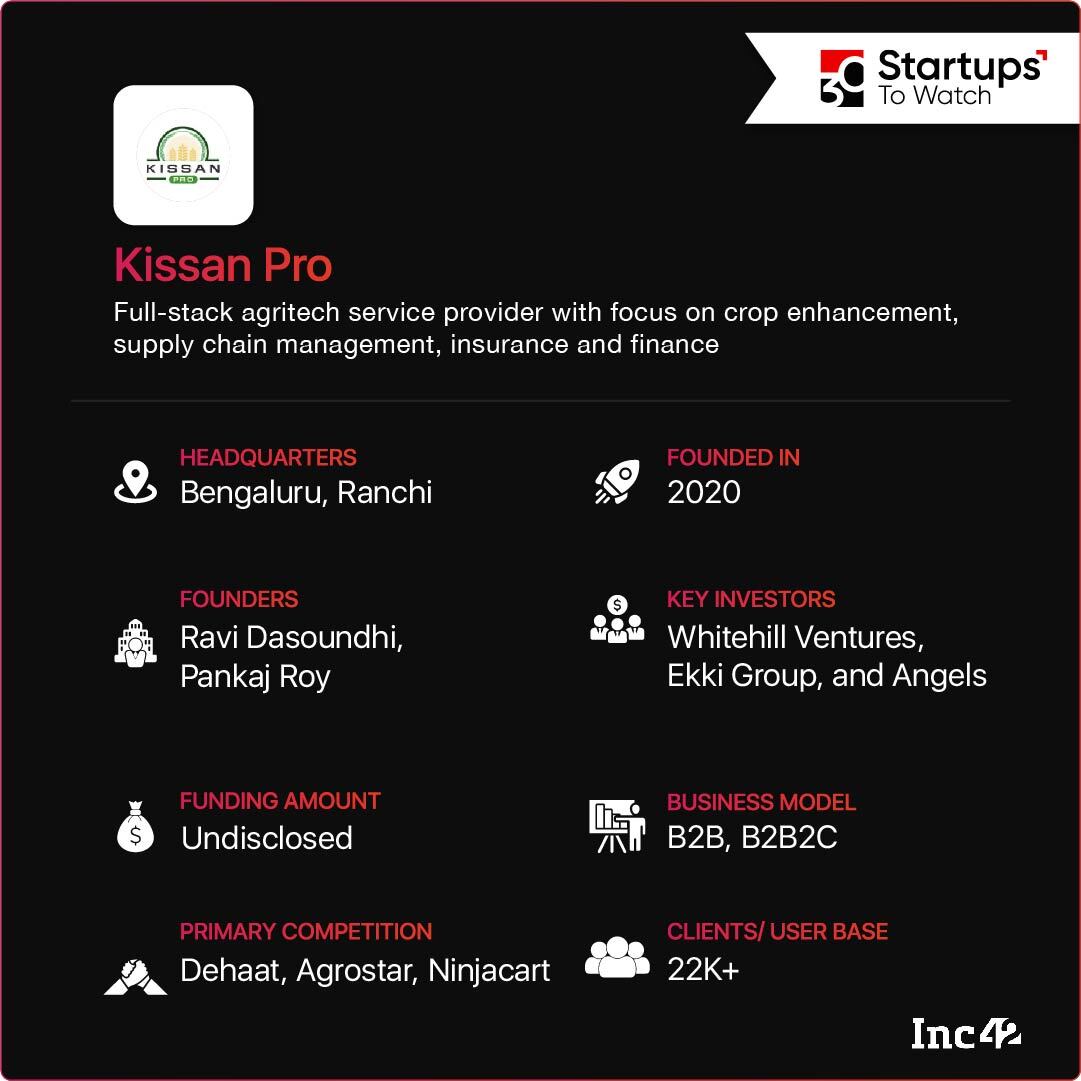
Why Kissan Pro Made It To The List
Most Indian farmers fail to earn sustainable incomes due to their inadequate knowledge of modern crop science, poor access to the latest technology and a broken supply chain with too many middlemen that drains out profits. So, Bengaluru-based Kissan Pro focusses on these core areas to maximise farmers’ incomes and benefit all stakeholders in the process.
The startup offers a host of tech- and data-driven solutions on the cultivation side, including crop advisory and yield prediction, irrigation equipment automation and irrigation scheduling, soil moisture, plant health, canopy and anomaly monitoring, and water and energy usage tracking.
It is also developing an end-to-end supply chain — from providing land and crop-efficient customised input to directly selling to end consumers to facilitating crop finance and agricultural insurance. In addition, it has set up 200+ help centres to conduct farmers’ training and collect farm produce for sorting, grading and packaging.
The company has adopted a revenue-sharing model and sells farmers’ agri produce to institutional buyers (food processing companies, exporters, wholesalers and the like) to ensure fair pricing. It also supports the sell-before-harvest model instead of the harvest-and-sell format, thus encouraging demand-based farming.
Kissan Pro currently manages more than 40,000 acres of land in Jharkhand and caters to a network of more than 22K+ farmers. It plans to expand its operations in three more Indian states and onboard 5 Lakh+ farmers in the next two years.
kWh Bikes
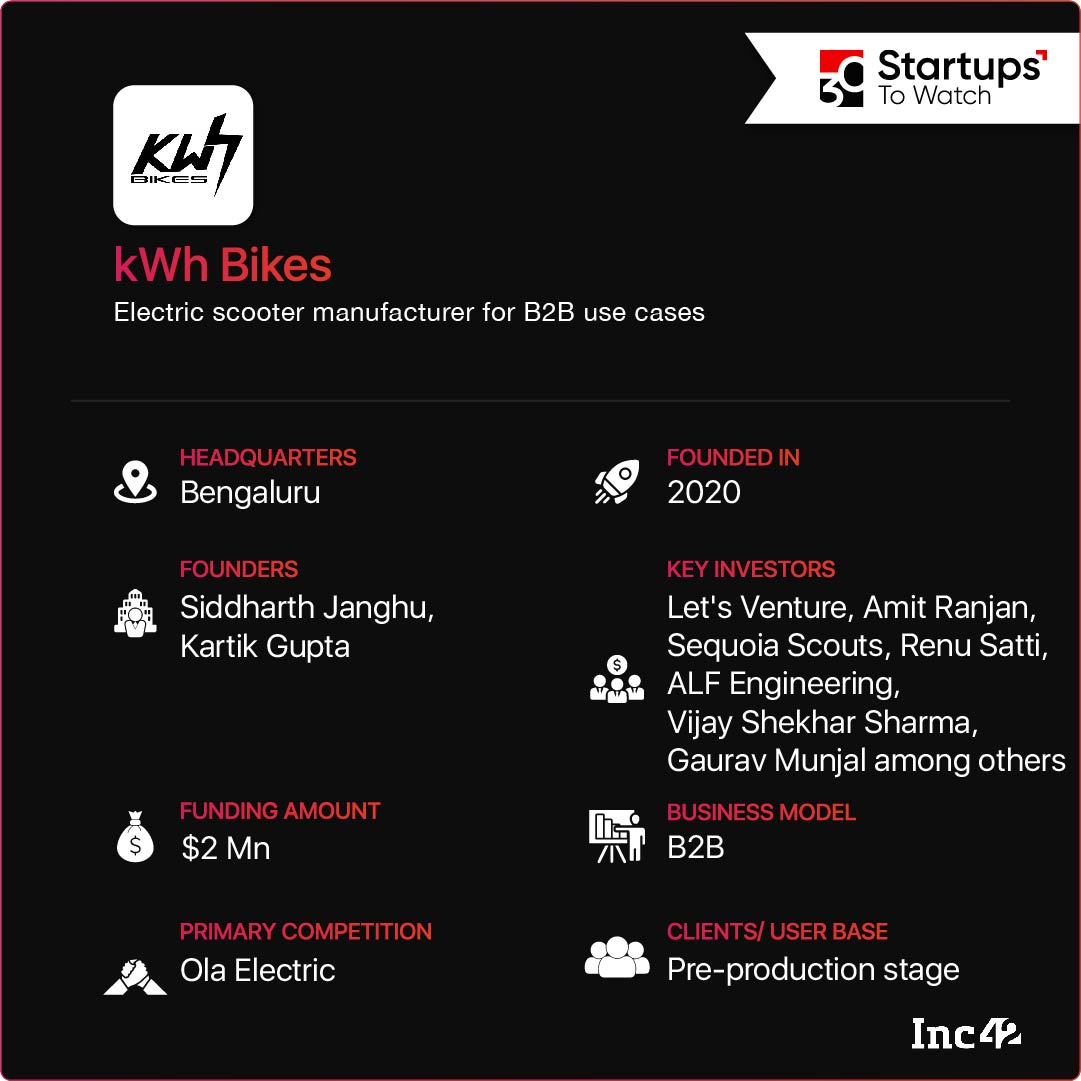
Why kWh Bikes Made It To The List
India is home to around 1 Mn delivery executives, and this number is growing at a fast clip, thanks to the accelerated growth of ecommerce. But rising fuel costs and the growing awareness of the climate crisis have compelled the likes of Flipkart, Swiggy and Zomato to go ‘green’ and electrify their fleets. Sensing a huge market potential for the long term, further cushioned by government incentives and green credentials, Bengaluru-based kWh decided to build multi-utility electric scooters to cater to enterprise customers.
The company has developed working prototypes that can cover 150 km on a single charge and has a top speed of 70 kmph, a loading ability of 250 kg and a peak torque of 140 Nm. It also sells EV chassis, battery packs, vehicle control units and motors separately for additional revenue.
Although its scooters are still in pre-production, kWh claims to have received expressions of interest (EOIs) for more than 15,000 units. Going forward, it plans to enter the B2C market and compete with the likes of Ola Scooter, Ather, Hero and others.
Marketfeed
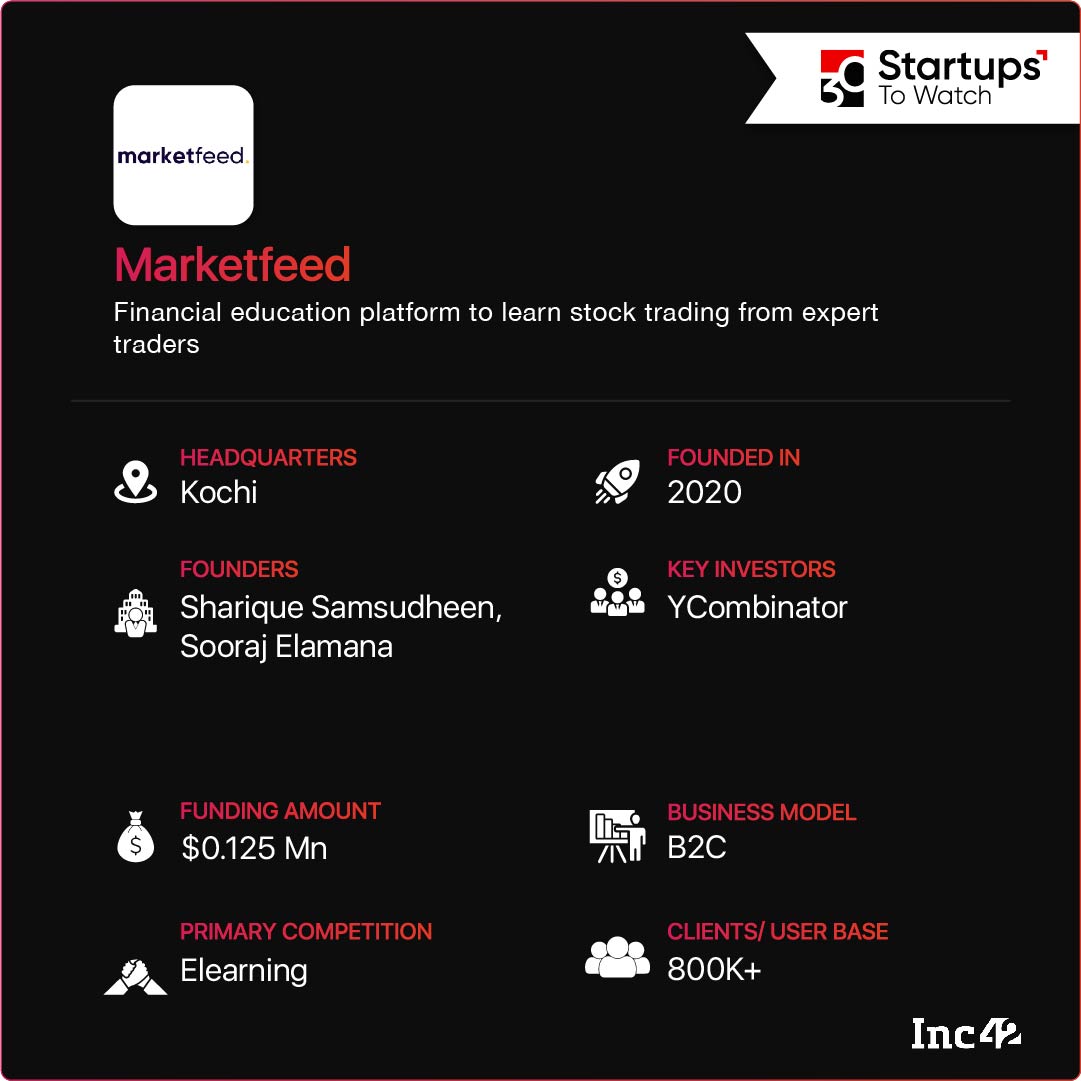
Why Marketfeed Made It To The List
Investing in stocks is a lucrative option for all, but small and retail investors often avoid this asset class as they lack market knowledge and experience. To address this knowledge gap, Sharique Samsudheen started a YouTube channel in 2018 and trained people about the stock market nitty-gritty. He did it in Malayalam to cater to a regional audience and soon had a large user base. Two years later, he launched the Marketfeed app with Sooraj Elamana and brought in other stock market gurus. The idea was to teach how to trade in the stock market to optimise wealth creation.
The app offers certificate courses and has a freemium model in place. Pre-recorded sessions at Marketfeed do not cost anything. But a subscription fee is charged for one-on-one live sessions with experts, community-based learning programmes and exposure to virtual trading rooms. The Kochi firm claims that 80% of the investors have earned profits after completing these courses.
It also provides live feeds on trending stock market news, expert’s advice, pre-market and post-market reports and a personal finance companion for tax filing, investing in mutual funds, and buying insurance through its sister channel Fundfolio.
The startup has tied up with fintech firms such as TradingView, Zerodha, Smallcase, Tickertape, GoldenPi, Upstox and others to provide authentic information round the clock. It plans to introduce personalised trading courses in the future.
Niro
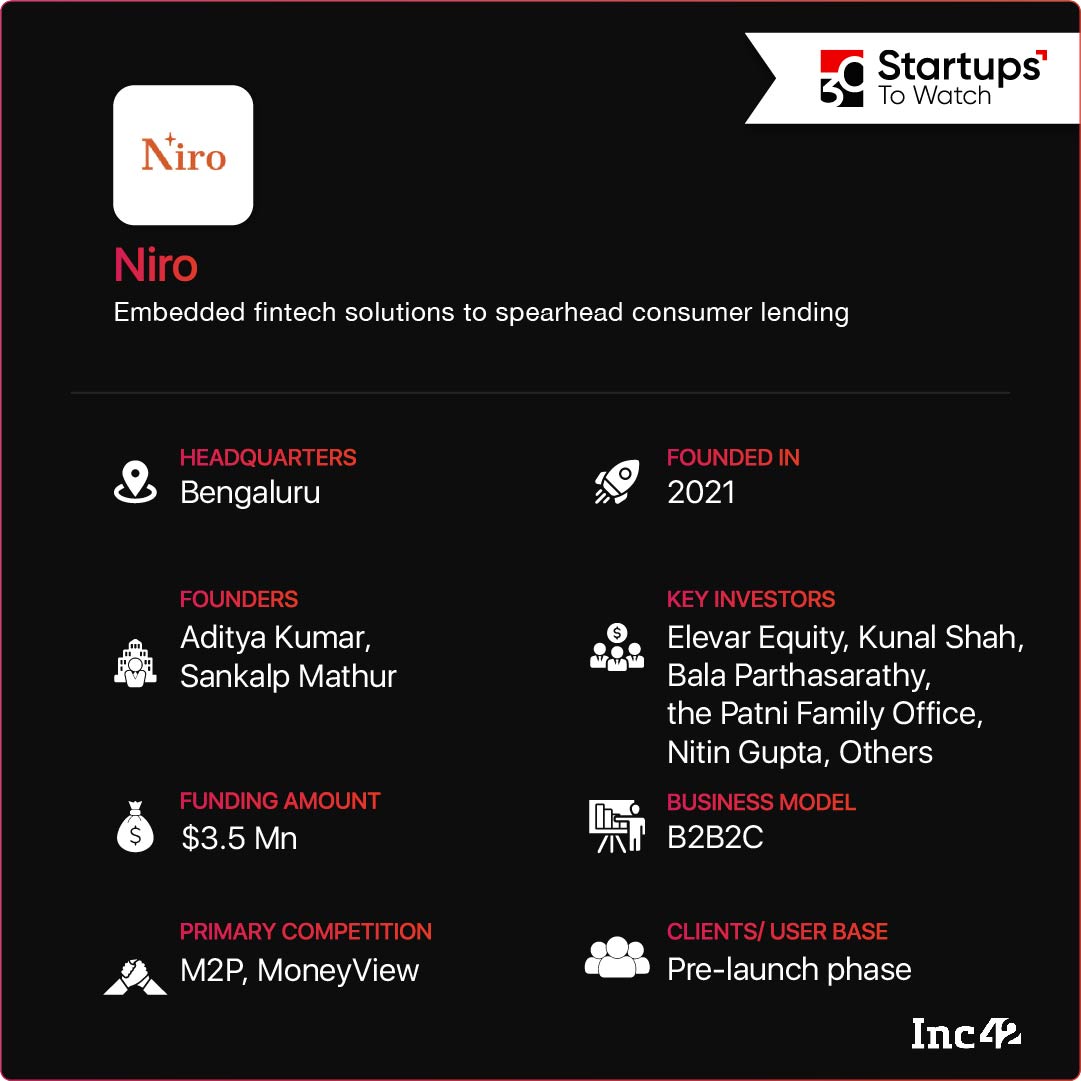
Why Niro Made It To The List
In India, the consumer lending industry is far from inclusive and primarily caters to customers with INR 6 Lakh+ incomes and 740+ credit scores. Aware of this huge gap, Bengaluru-based Niro aims to widen credit availability for 624 Mn active internet users who do not qualify for legacy loan programmes.
The startup claims that banks and NBFCs usually lack product and tech capabilities, have a limited risk appetite and are hindered by geographical constraints to widen their loan ecosystem. In contrast, Niro offers APIs and SDKs to embed personalised and competitive credit offerings across consumer internet platforms and turn them into consumer lending fintechs. In turn, these platforms (fintech, ecommerce, classifieds and more) can spearhead credit distribution among their respective customers minus the tedious loan approval exercise.
Currently, Niro is building its tech products to facilitate such credits. It has also tied up with an NBFC and a classifieds platform with more than 10 Mn ‘creditworthy’ users to roll out the credit chain where all stakeholders will earn through interest difference on the capital supply.
Omniflo
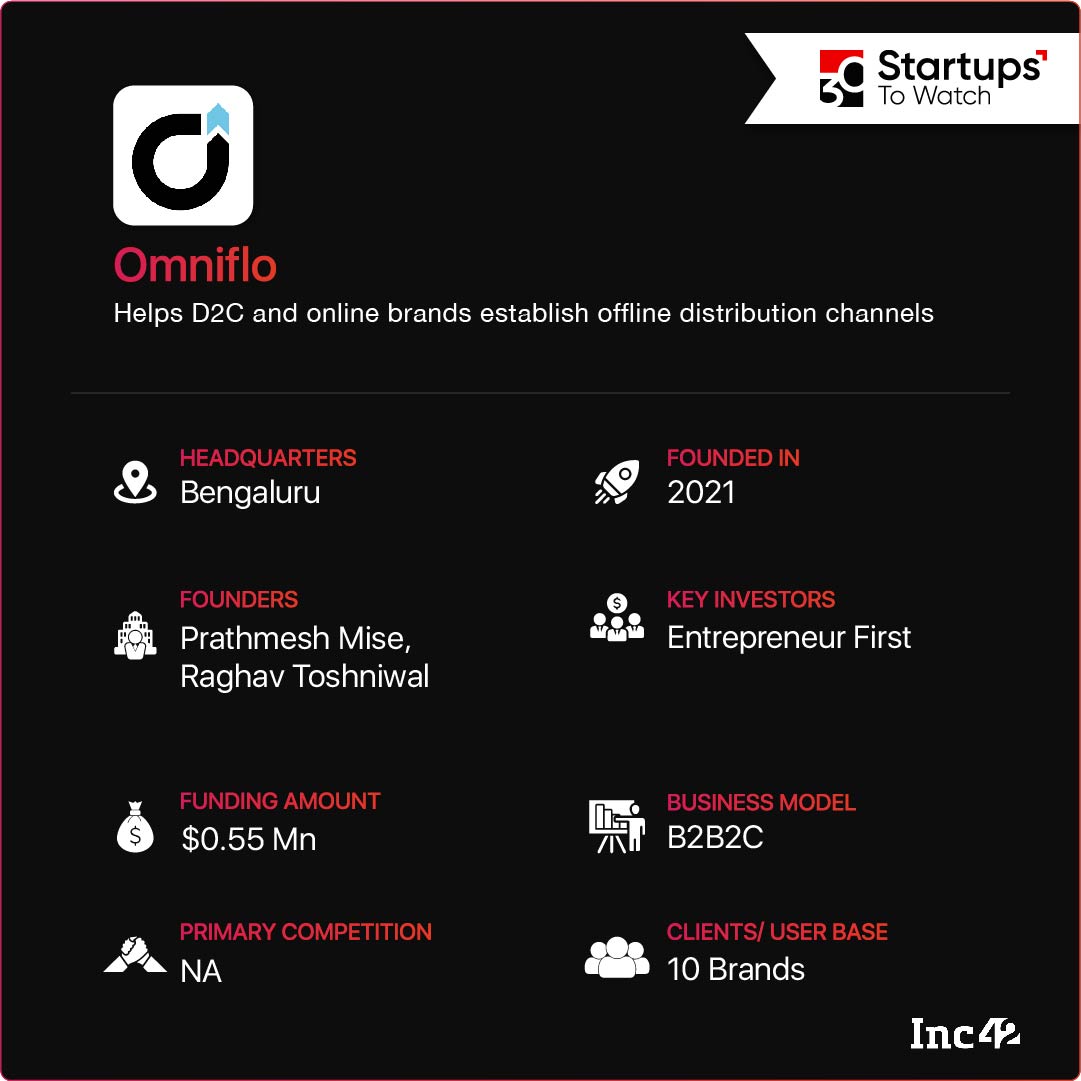
Why Omniflo Made It To The List
While businesses are going increasingly digital and consumers are leaning towards the trend, Bengaluru-based Omniflo is helping D2C brands build an offline presence to get them started on an omnichannel journey.
According to the company, 90% of product consumption in India is still happening through offline routes. However, after speaking to more than 50 D2C brands, it realised that going offline was a bigger challenge than doing business online.
“There needs to be a better way for online-first brands to get closer to their customers and address a larger market,” cofounder Raghav Toshniwal told Inc42. So, it leverages data-driven insights on geography, market size, product placement, supply chain management and other factors to offer a plug-and-play solution, enabling online brands to grow reach, sales and traffic.
Omniflo has signed up 10 D2C brands to take them offline in a cost-effective manner. In doing so, it banks on shared infrastructure (no investment in additional manpower, warehousing or logistics) and a focussed go-to-market strategy, primarily through Tier 1 supermarkets. The startup plans to take 500+ D2C brands offline in the next five years.
PowerLoom Protocol
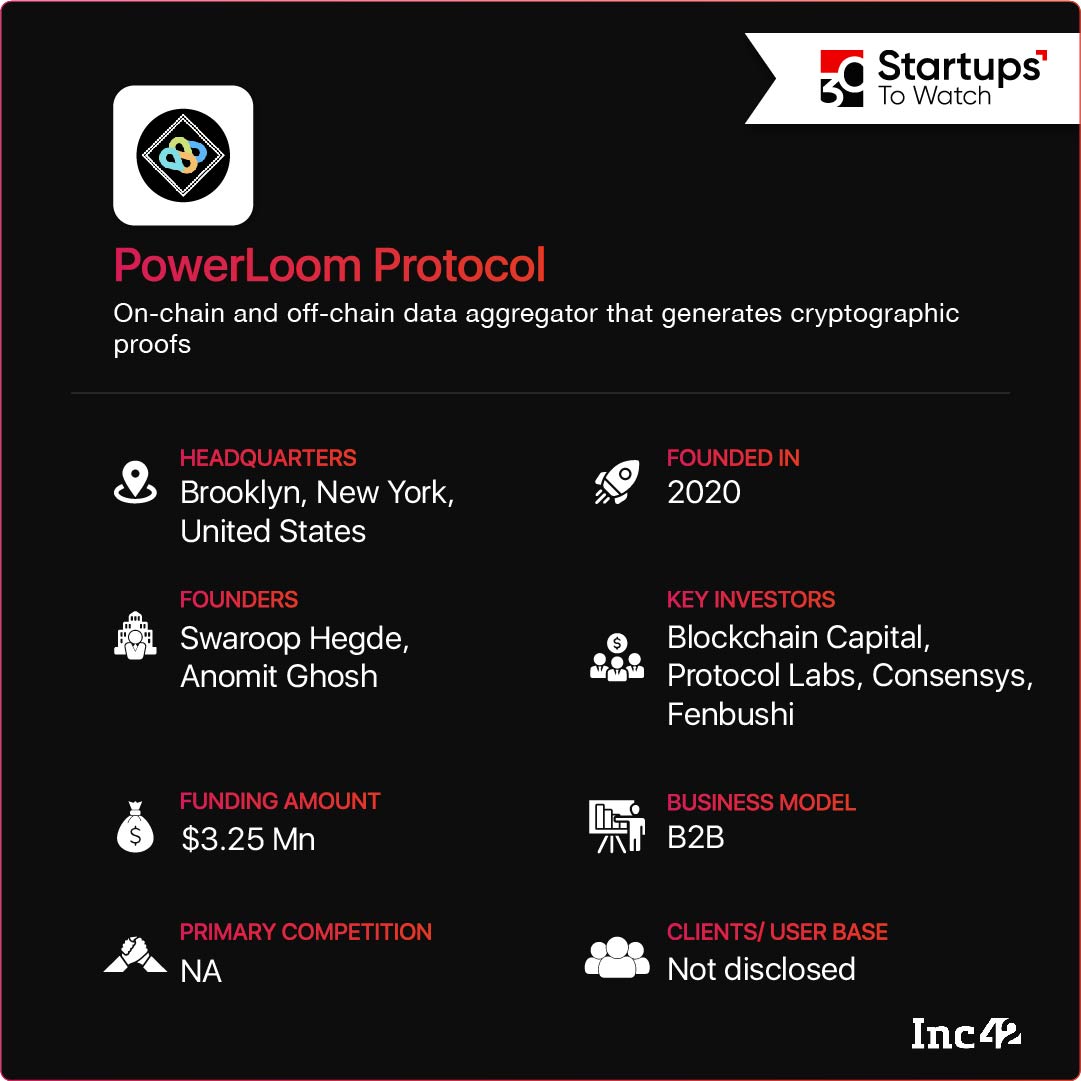
Why PowerLoom Protocol Made It To The List
With Web 3.0 and the metaverse knocking at the door, decentralised apps (dApps) require better security and privacy, giving rise to cryptographic operations on the blockchain architecture. However, designing scalable and robust cryptographic primitives (algorithms used to build security system protocols) is tough. And it is even tougher to check the viability of these primitives.
California-based PowerLoom aggregates on-chain and off-chain data to generate snapshots with cryptographic proofs to enhance the current system. Similar to an audit form for accounts, PowerLoom identifies proofs on the blockchain through smart contract functions. It further offers a chronological, replayable trail of activities that can be independently audited. Although unheard of in the layman blockchain ecosystem, primitive authenticators like PowerLoom ensure accountability on the chain besides bringing decentralised validity to all popular protocols.
The startup’s first product, Boost, is in alpha and currently offers access to common data points (token balances, asset portfolios and so on) to weave state data across related smart contracts on the EVM chain. But it will eventually improve DeFi protocols and dApps by helping developers build on cross-chain logic.
PredictiVu

Why PredictiVu Made It To The List
Every business depends on a relevant market matrix to boost marketing strategies, sales and overall growth. But as big data floods almost every industry, it is essential to limit the overuse of data-driven intelligence.
In order to track, access and analyse the most relevant data in the retail space, Gurugram-based intelligent data science platform PredictiVu has automated the entire function and does the targeted data analysis through its Dynamic Marketing Optimizer. This helps provide consolidated business intelligence and a 360-degree view of the business environment. The company is currently building enterprise solutions to provide aggregated and analysed data on consumer behaviour, sales, ad spend and web and social activities derived from more than 100 data silos.
PredictiVu is still in beta but claims to collect and analyse data from 75K+ retail outlets across 100+ Indian cities. It is also capturing the sales data of more than 50K consumers every month. The company will adopt a subscription-based revenue model and also offer retail touchpoints through its PoS solution.
Its long-term plan is to service 200K retail outlets across 600+ towns and cities in India and capture and analyse sales data of 5 Mn+ consumers every month.
Rulezero
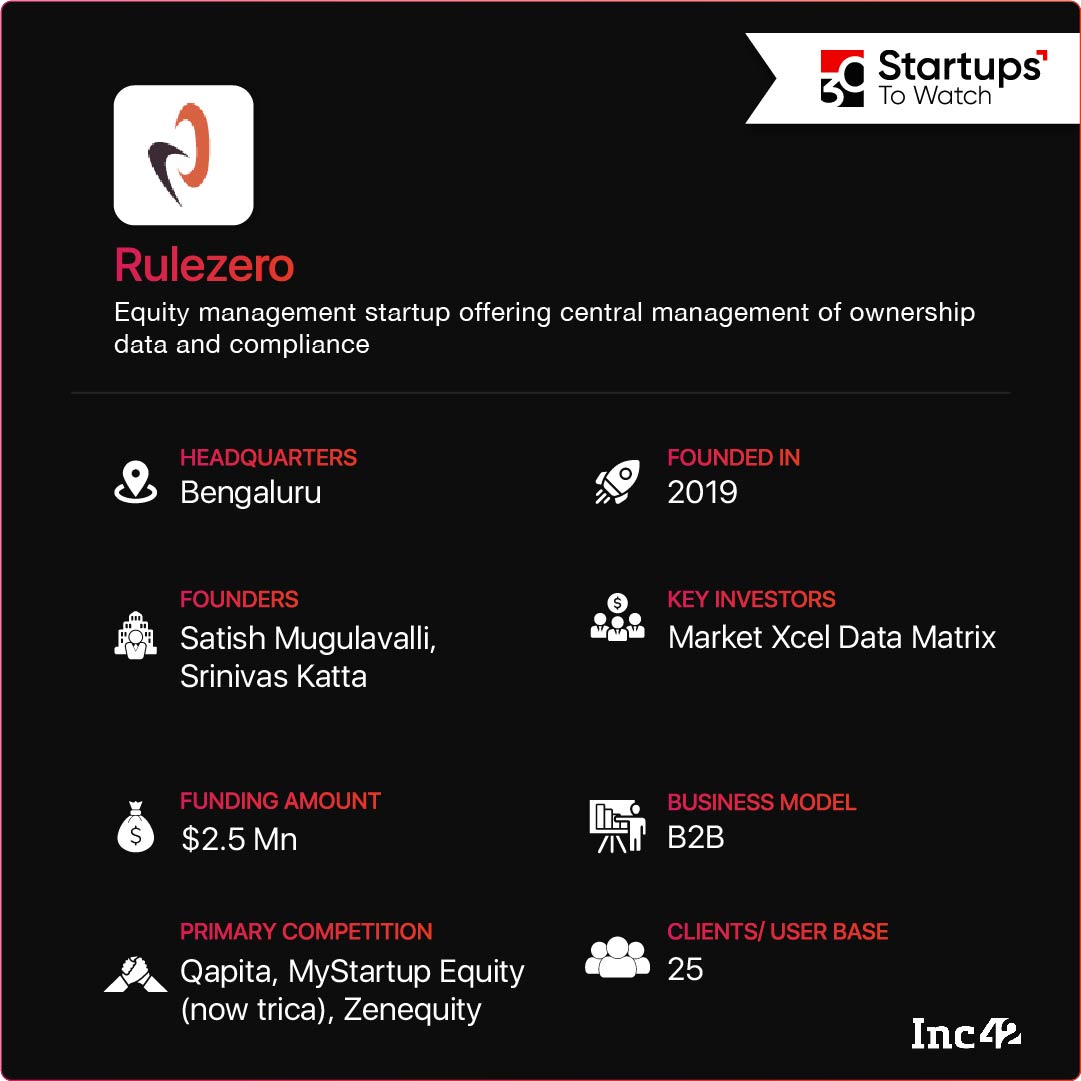
Why Rulezero Made It To The List
Public companies in India are bound by SEBI guidelines that ensure up-to-date and easy-to-access company records and details of stakeholders. But for private businesses, especially MSMEs and startups, there is no central management of ownership data, and the compliance level is not up to the mark.
As poor compliance and inadequate data often hurt a company’s reputation and growth, Bengaluru-based Rulezero aims to bring order to a traditionally unorganised market by blending tech, compliance and data aggregation. It has developed a B2B SaaS platform called Hissa that manages ownership data of startups, right from onboarding to the exit of a stakeholder.
It also automates share issuance processes and ESOPs, provides mechanisms to track and certify cap tables, reviews funding documents and records (non-finance) transactions.
Apart from routine paperwork, the company acts as an advisor that automates diligence, forecasts capital requirements and provides analytics to drive capital and shareholding decisions.
Rulezero claims to be working with 25 early-stage startups and has more clients in the pipeline. It plans to bring in late-stage startups with big revenue cheques and offer subscription-based services. More features will come up, including products to enable liquidity through buybacks and secondary stakes.
SalaryBox
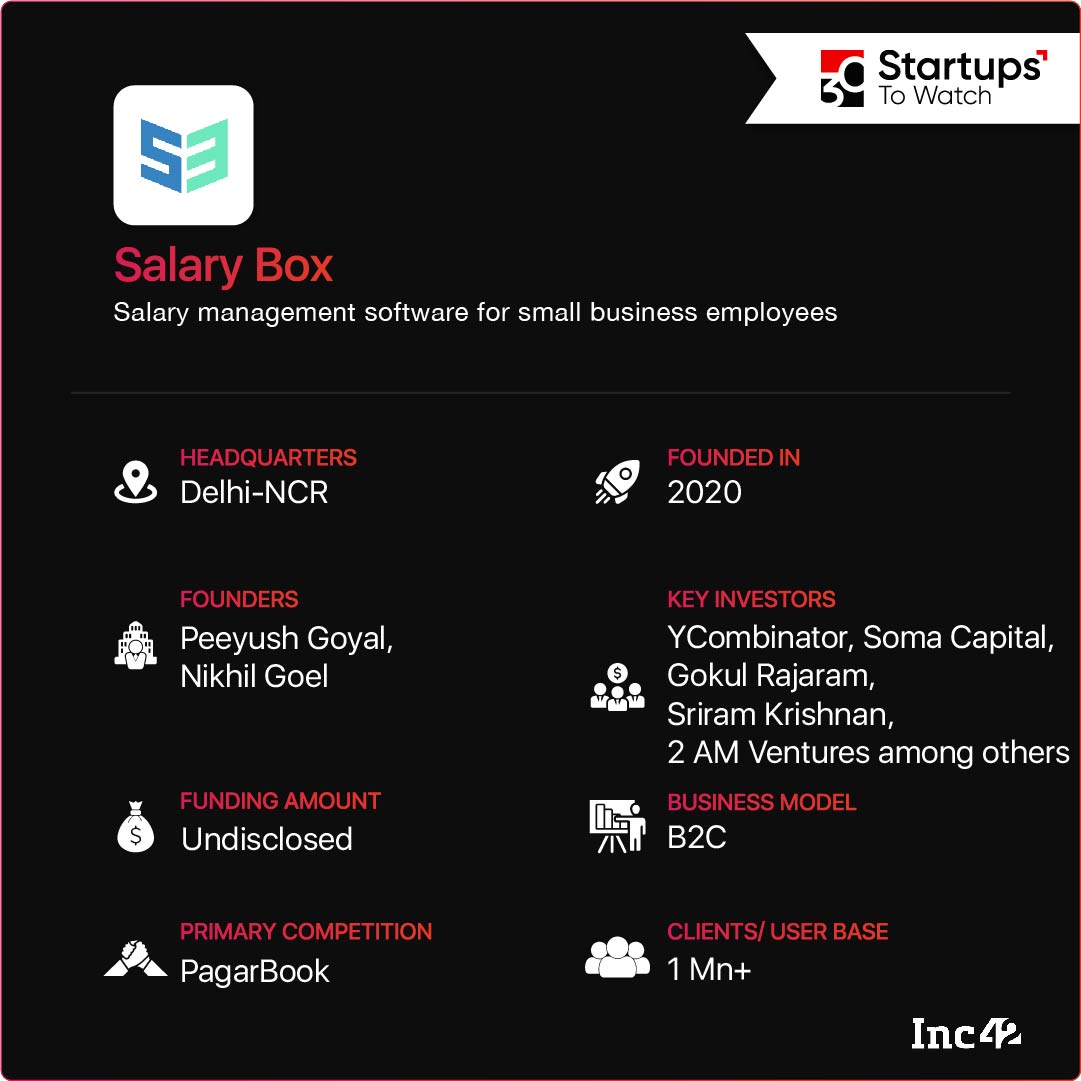
Why SalaryBox Made It To The List
India has around 63 Mn MSMEs that employ blue- and grey-collar workers. However, 90% of them still manage payroll manually — recording attendance on paper, calculating salary on excel and paying employees in cash.
Aware of the time and effort invested in this essential but routine exercise, Gurugram-based SalaryBox has built a mobile-first SaaS solution to digitise salary calculations and payments for small businesses. On its app, salaries are automatically calculated for different wage types after considering attendance, leaves, allowances, overtime pay and salary advances. It also features a selfie-based attendance system, GPS-based employee tracking and a task-sharing module.
The app further allows business owners to disburse wages to all types of employees, file government-mandated compliances and enable financial inclusion of the underserved segment unable to access institutional credit.
The service is currently free, but the main agenda of the salary management platform is to bring blue- and grey-collar employees under the financial umbrella through payroll and employment details. Once the data is in place, it can be easily shared with financial institutions to avail loans or make investments.
SalaryBox claims it has registered 1 Mn+ employees within 10 months of its launch. It is currently working on a ‘wage access’ feature to provide employees 24×7 access to income data instead of an occasional glimpse on paydays. In addition, the company aims to create first salary accounts for 300 Mn+ blue-collar workers by 2025.
Skyber
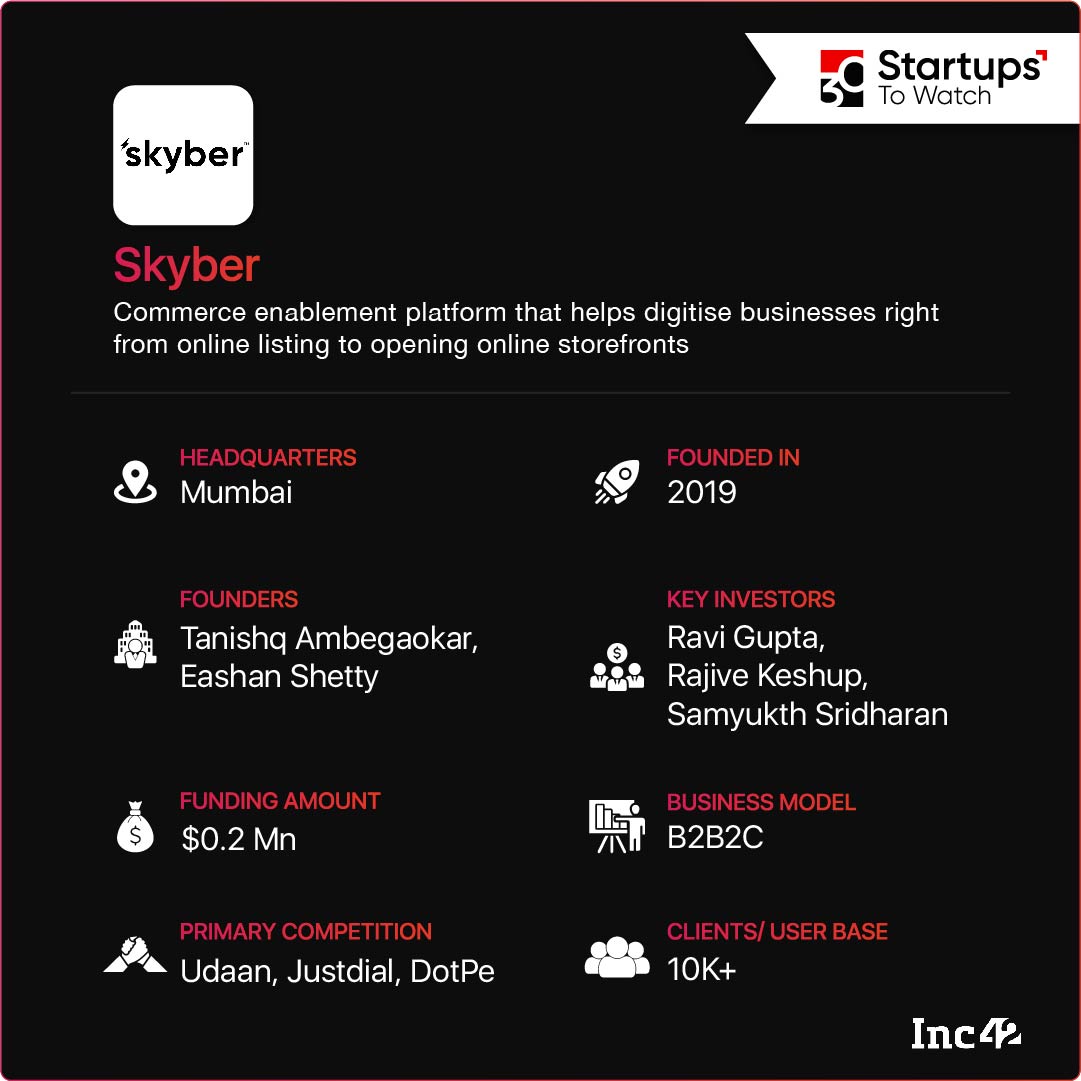
Why Skyber Made It To The List
With the pandemic accelerating large-scale adoption of digital tools, many small businesses have turned a page and tried to leverage the benefits of the internet. However, 80% of these businesses in India are not listed on any third-party ecommerce marketplace or discovery platform, which hurts their growth potential, says Mumbai-based Skyber. So, the startup has developed its flagship product called Bazaar, a SaaS-powered ecommerce marketplace, to make merchant onboarding and product discovery quick and hassle-free.
The platform helps offline businesses get online listings (similar to what Reliance-owned Justdial does) for fast discovery and allows small businesses to set up online storefronts to start selling directly to customers. Other features of the Bazaar app include managing the complete business process through order fulfilment, payment enablement, inventory management and handling quotations received from prospects (akin to ecommerce enablement).
Skyber’s Bazaar is still in the development phase and does not charge any commission for enrolling in its pilot project. However, the company claims that it has already onboarded more than 10K merchants on its platform. The company is also looking to increase its early merchant base, build a digitised retail platform for 22K+ product categories such as health, beauty, food and electronics, and work on its monetisation model.
Smartstaff
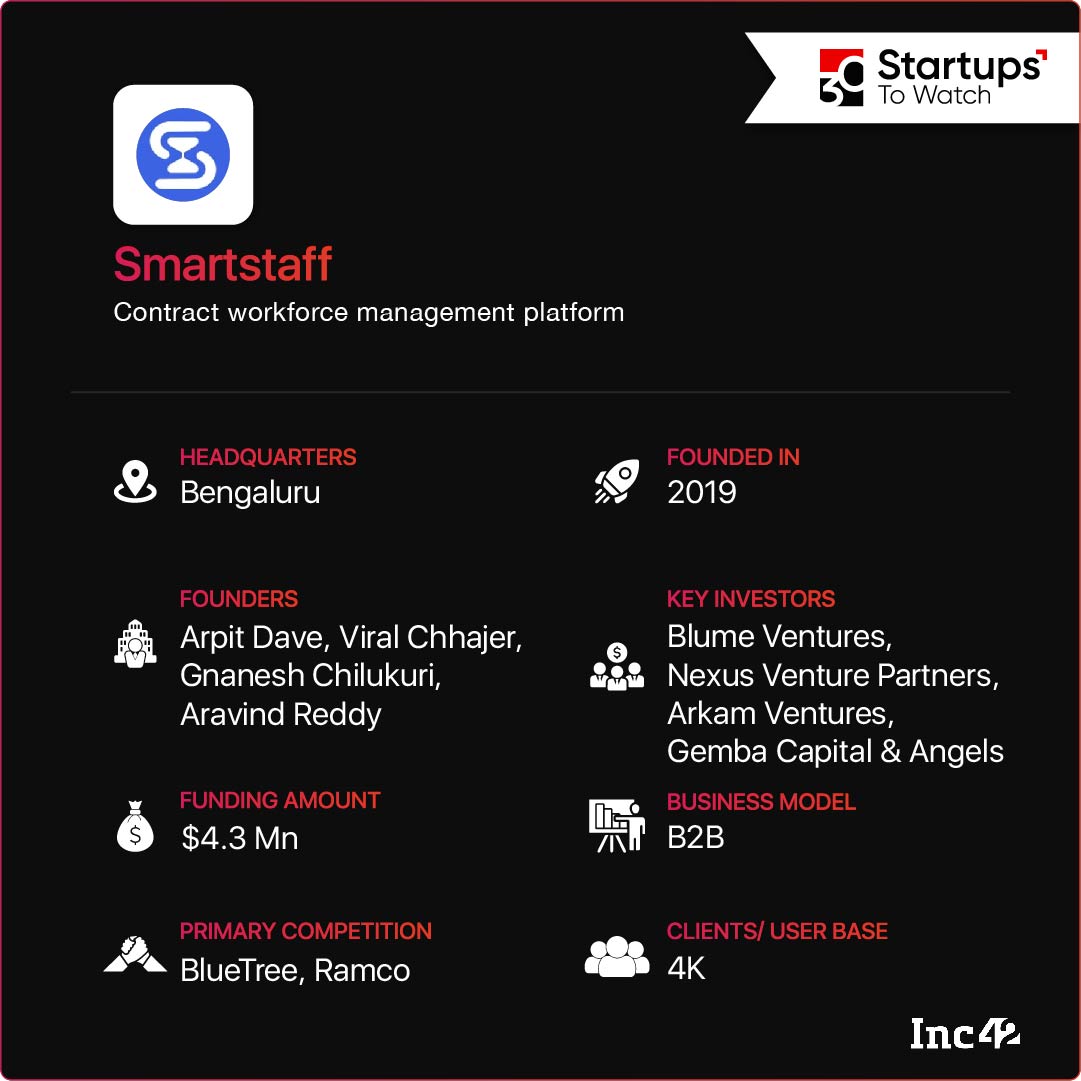
Why Smartstaff Made It To The List
Post the pandemic, manufacturing companies in India seem to be adopting digitalisation en masse. But their workforce management practices remain old school, and paper registers are still used at factory gates. As the manufacturing industry alone employs more than 12 Mn contract workers in the country (usually managed by contractors and other intermediaries), these manual processes lead to a massive waste of time and resources.
Bengaluru-based Smartstaff (previously Qikwork) aims to replace this chaotic patchwork of contractors, middlemen, paper registers and excel sheets to optimise workforce management in sync with the work-smart digital era. The company claims it is developing a Google Workspace-like workforce management platform for blue-collar workers.
But there is more to its service bouquet. For starters, it has a database of blue-collar workers, and businesses can employ them as per requirements and manage this workforce via the Smartstaff app. Companies can also onboard their existing workforce on the app and manage their shifts, engagements, attendance and payrolls.
Smartstaff claims to have more than 4,000 active workers on this work-fulfilment platform, clocking 30K+ man-hours every day. There are two payment modules for engaging these Smartstaff workers. One can pay a fee for each man-hour or opt for a flat fee per active worker. Contract workers can also search and find jobs on this platform. Some of the startup’s manufacturing partners include Raymonds, Enamor and Dixcy, among others.
The company recently raised a seed round of $4.5 Mn for rebranding (from Qikwork to Smartstaff) and hiring a tech team. It is also expecting to onboard 10K workers by FY22.
Zevi
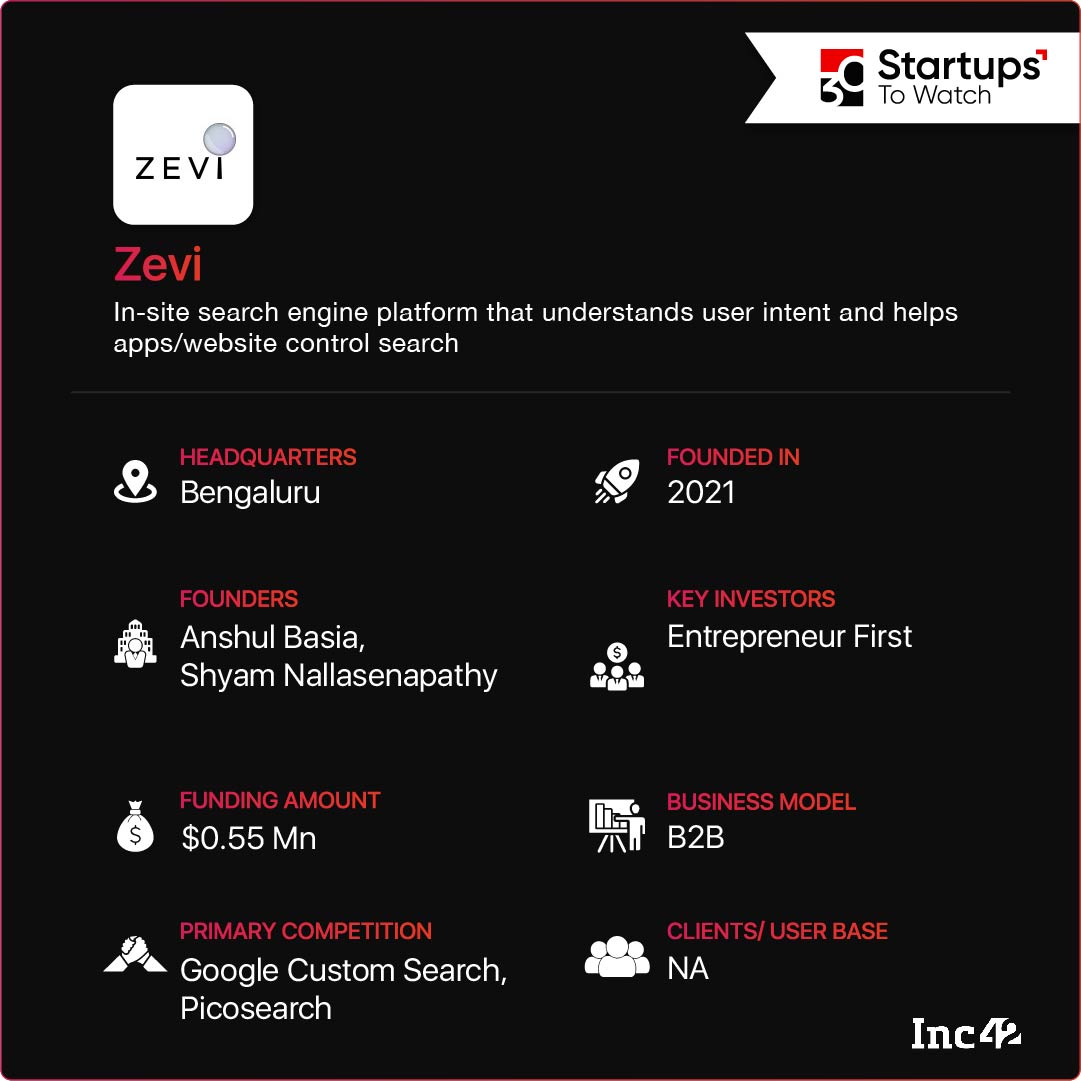
Why Zevi Made It To The List
Most tech enablers focus on search engine optimisation to help maximise inbound traffic for their clients. But Bengaluru-based Zevi has gone one step ahead and redefined in-site search for brands, retailers and ecommerce stores.
Powered by natural language processing and vernacular support, this search engine can handle mixed-language queries such as Hindi+English, Spanish+English, Marathi+Hindi and so on. It also figures out synonyms and correct spellings when a user queries it and fetches suitable products.
Zevi allows its clients to control search, customise search experience and check insights and product ranking through a smart panel. In the past three months, the Zevi solution was integrated with the ecommerce stores of three brands, while five more pilot confirmations are in the pipeline.
Zolnoi
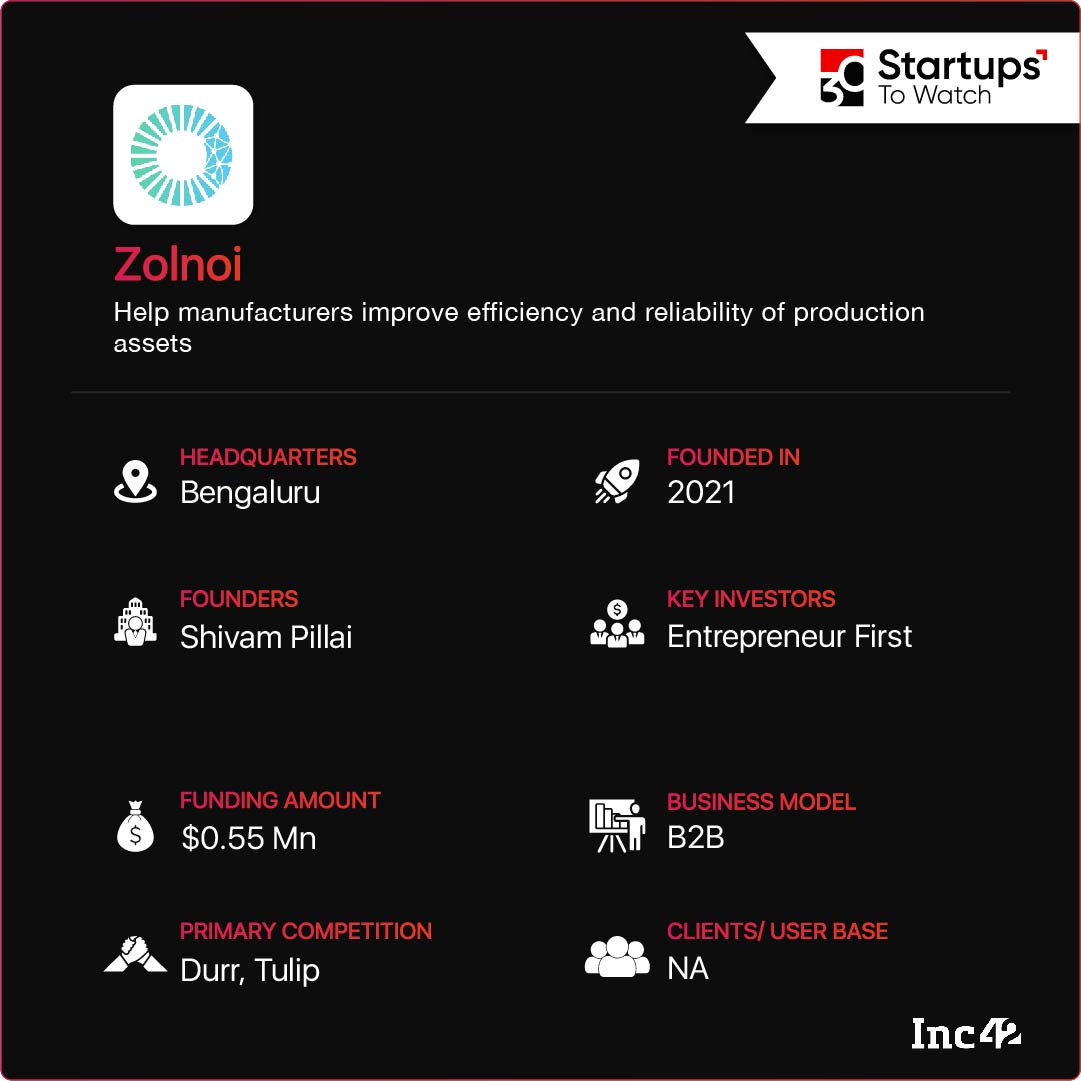
Why Zolnoi Made It To The List
According to an HBR study, more than 30% of manufacturing output is wasted due to operational inefficiencies. In India, the key reasons behind such output dip are the lack of digitalisation and tech upgrades. That is why Bengaluru-based Zolnoi has leveraged deeptech (IoT and AI-ML) to develop predictive maintenance solutions that transform production line operations.
Its flagship product, Zolnoi Integrate+, is a subscription-based SaaS platform that uses IoT for production data gathering and visualisation and proprietary AI for predictive analytics to offer an end-to-end insight generating tool for recommending suitable action. The service bouquet helps improve the production and maintenance regime as it is integrated with existing processes to enable data-driven decision-making.
Zolnoi has delivered pilots for three medium-to-large scale F&B manufacturers and claims to have saved millions of dollars in maintenance.
[Edited By Sanghamitra Mandal]
The post 30 Startups To Watch: The Startups That Caught Our Eye In October 2021 appeared first on Inc42 Media.
0 Comments